#just rambling to myself at this point
Explore tagged Tumblr posts
Text
The reason why I always say that Palestinians know the system better than anyone else is because we can see how it's weaponized to its fullest, yes, but we also see the multitude of ways they use the backing of the government system to blatantly lie about who we are and turn people against us. The government only ever benefits those in power and the people refusing to abandon the power of the government are the people with the most to lose in these situations. People who argue "Oh that's not how the government spending works" when we point out how money is used for war rather than spending for community projects don't understand, or maybe don't want to understand, that this in itself is the problem we are trying to draw attention to.
And even with things like... pointing out that the """"peace festival"""" was on the border of Gaza, which is said to be a "security threat" by the Israeli government, and was given permission to EXTEND its festival there — people still scoff that I would DARE say this when SO many people lost their lives but it still holds true in that these people conducting the festival really did not care they were across the street from a concentration camp as they celebrated whatever the fuck they were celebrating and that they lost their lives celebrating while they KNEW there people starving and locked up in a huge CAGE — what makes it worse is that the Israeli government gave it a stamp of approval. Like isn't that messed up? Isn't that absolutely batshit?? If you told ME you're holding a party a couple miles away from the concentration camps in America out of literally EVERYWHERE you could go, I'd be like "You're incredibly cruel" and I'd stop being your friend.
And when we come back to October 7th, like what's really ridiculous to me is that al-Qassam would go on a killing spree despite the fact that they had a time sensitive mission with a clear goal (that they already put into effect!) of getting hostages, hiding, and negotiating for the release of Palestinian prisoners. They don't have fucking time to go find and behead 40 babies, let alone need or WANT to, but somehow the state managed to twist this into a perverse act of vengeance that the unruly Brown Man has been itching to do to the poor and innocent White People (who also live across the street from the concentration camp) and people ate it up because of course those TERRORISTS want to kill people for no reason, of course. Nevermind that they stated their goal. Nevermind that they are trying to release political prisoners that the PA avoids helping at all costs. What they were doing in that kibbutz was only to kill and maim and torture because THATS what the state of Israel told me and Hamas is a bunch of antisemitic bloodthirsty men who only want to sew discord into your lives.
You people who are still using Israeli talking points about hamas but still proclaim "support" for Palestine are just so transparent in how you want to dictate Palestinian liberation to suit your own needs before it helps Palestinians.
207 notes
·
View notes
Text









jltg tom scott despair moodboard.
#tom scott#rambles#jet lag the game#THE STRUGGLERRRRR#the airplane scene from the finale is killing me.#like imagine being sam denby in an airplane with tom scott and he is just having a mental breakdown next to you.#and all you can do about it is point the camera you are holding towards him. i would kill myself.
420 notes
·
View notes
Text
Falin who cares too much and too little - analysis
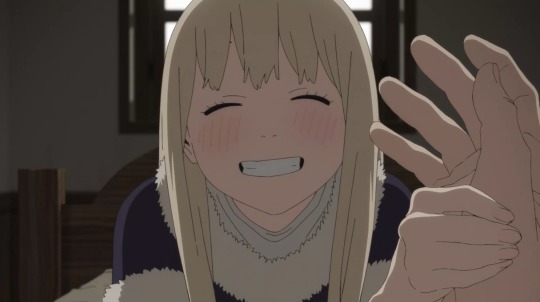
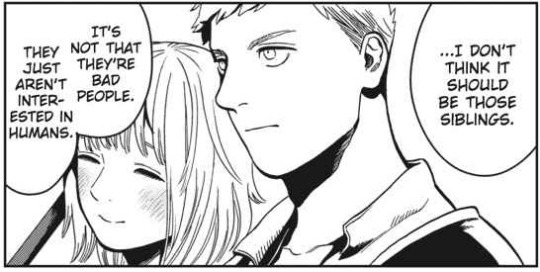
Been stewing on Falin thoughts for a while, I know I have an interpetation on her that differs from many but I’m jumping into the fray. I think there’s a lot to be said about what we do see of Falin. This shorter Falin analysis I made is heavily encouraged prior reading. This analysis mainly explores her complex relationship with caring and so it’s sort of structured in two halves, with Faligon at the crux of it all.
Falin cares too little :
A lot of people assign Falin a people pleasing mindset and I… Don’t agree. We never see her care at all about people in her town or at the academy not liking her.
We do see her worrying about what people think of her… ONCE. And Laios comforted her, told her they didn’t matter and she should be proud of herself. She latched onto that hard. That’s why this scene was so important to be included during the dragon fight, relationship-defining; it’s always been them against the world. She grew to not care what others thought, to only focus on her close loved ones. No one else matters.
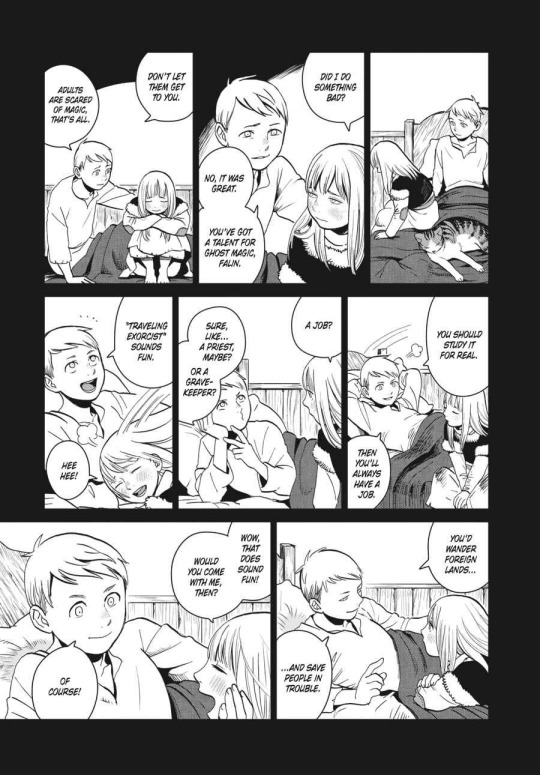
Laios’ words were her world. Her older brother who taught her how to feel comfortable with herself, who told her, you’re great, others are the ones in the wrong to not see that, I’ll always be with you, always be there for you. Older brother who always made great plans, who always knew more, who was better at wrestling to name the dogs, who she has always idolized. Laios who always spoke of traveling the world, to which she always said she wanted to follow. And she would, she’d follow him even if it meant leaving the academy and all she knew behind, she’d follow him to the ends of the world, and that’s what she did.
She didn’t care about showing to her classes or keeping up such appearances, she doesn’t even think of toning down her jumping into bushes when Marcille recoils, etc. She acts like an obedient pawn often, to her parent’s directives and then following Laios around no matter what he decides to do, but I don’t think the motivation is people pleasing, rather it’s being with & caring for her loved ones, and her go-with-the-flow attitude enhances the impression. Not that it’s as simple as that, mind you, but let’s talk about this for now.
Falin is perceived as selfless because we, the audience, have our perspectives revolving around the main people in her life (Laios, Marcille). They’re the ones she’s devoted to and people who care about her back a lot too, but to people like her classmates or the towspeople she probably must have seemed like someone who didn’t care about the people around her or her surroundings a lot, who just went on alone and did her own thing.
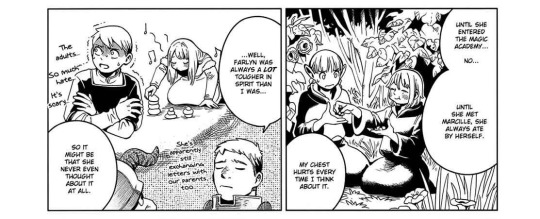
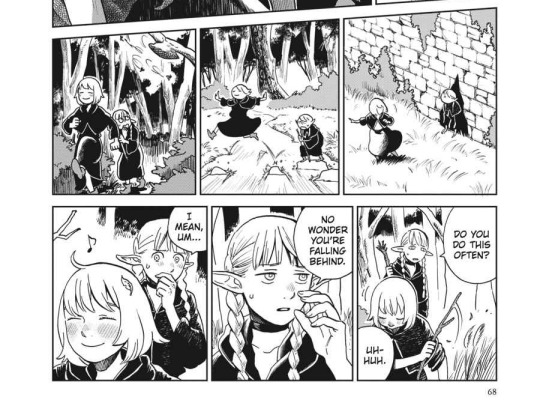
What matters to Falin? From what place does her kindness come from? Is a part of her keeping up appearances? And I think that’s the point, the horror of Faligon as well, that we can’t tell just how in control Falin the person is as the chimera (because we are shown that she’s in there, we just don’t know at what degree), that we don’t know her enough to be able to tell when she’s at her most genuine, her most raw. That even if you do settle on none of her being present as Faligon, we have to at least consider it, consider that she may be able to do something like this and have a part in it, brutal and uncaring. That even the lenses we see her through, the people who love her, may be unreliable.
And this is what’s very interesting about her too, she truly is so idealized by people around her as a saint. She’s so good and kind and caring to everyone etc etc etc. Laios, Toshiro and Marcille all see her as the paragon of goodness in the world. More cynical characters like Namari and Chilchuck have more layered opinions on her, the latter finding her somewhat unnerving because he can’t read her well. But then with that one flashback scene we see that… Her priorities are intensely focused on Laios and Marcille, she doesn’t care all that deeply about anyone other than them (+ maybe her parents). The rest of the party is in the same danger here but only Laios and Marcille who she’s speaking to get the special ,ention, and if they don’t cross her mind then of course she’d be ready to sacrifice strangers through a risky teleportation. That doesn’t make her not kind or caring!! Just that greater good isn’t exactly her priority. Any means is alright if the end result is her loved ones safe, it usually takes the form of healing and caring, but we see she’s ready to fight and make dangerous calls too. To me there’s this aspect to her that she isn’t as pure and magnanimous as everyone thinks she is, both in-world and interestingly enough meta wise as well, and there’s something interesting to that.
People pleasing implies a need to be liked, needs for the motivation to be that. A yes-man, etc. But if we analyze Falin, her general kind, smiling demeanor is more a matter of passivity I yhonk. Conflict avoidance is easier, so she’s friendly and hopefully things’ll be smooth sailing. It’s easy to be kind to classmates even if they act wary and rude if you don’t care about what they think either way. Of course she prefers good things happening to people over bad things, she is genuinely kind, but I think people tend to assign her a very grand altruistic way of life when to her the motivation is pretty self-centered. She doesn’t do what she does because she loves them, but because she loves them.
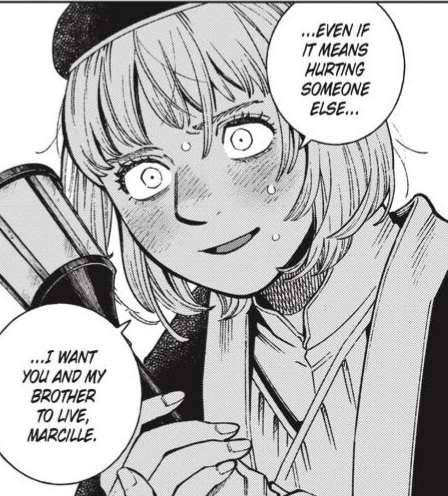
One situation that’s interesting to dig into for her way of thinking, and what I’m trying to get at, is Shuro’s proposal to her. I’ve seen people saying she hesitated because she didn’t feel comfortable saying no even though she wanted to, "I can’t say no, I don’t want to hurt him", something that sounds sensible and familiar, but it’s actually canon in the Adventurer’s Bible that the reverse was the case, that she didn’t feel comfortable saying yes. Because the offer was tempting, but it’d have been a loveless agreement on her end. And it makes sense she’d want to say yes too, like we see with the Toudens, marriage is very much a political strategical economical thing in their village, there’s even a bit on it on Laios’ Adventurer’s Bible profile about dowries, and both siblings were engaged very early. They lived poorly for a long time, it’s an enticing idea to marry rich, to have not only yours but your brother’s needs met forevermore easily, which at one point in their careers was their main worry and goal. Why shouldn’t she accept a life of leisure and wealth handed to her by a lovely friend?
So her hesitance was "yeah that’s convenient for me, but where it’s everything to him and heartfelt I’m able to be detached because I don’t care about it that much… Can I do that? I’m not reciprocating, not saying yes in the way that matters. Can I do that to him?" Very caring even though it’s not what you’d expect, isn’t it?
And central to my analysis, where I’m going with this is, I feel like that’s the thing with her character, that she doesn’t feel as strongly as she "should" sometimes, or feels a different way than she "should", or at least that she feels that way and others say she does. She didn’t mind suddenly leaving the academy, leaving Marcille behind and not seeing her for 4 years. She acted like it was no big deal that she sacrificed herself after getting resurrected after the red dragon fight. And in both those cases it upset the people around her greatly that she didn’t seem to get why it was such a big deal, didn’t seem to care about how they’d experienced her choices.
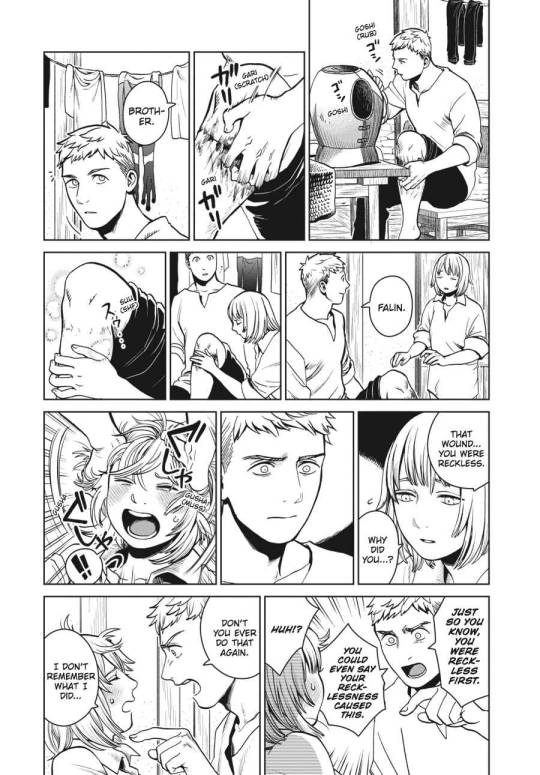
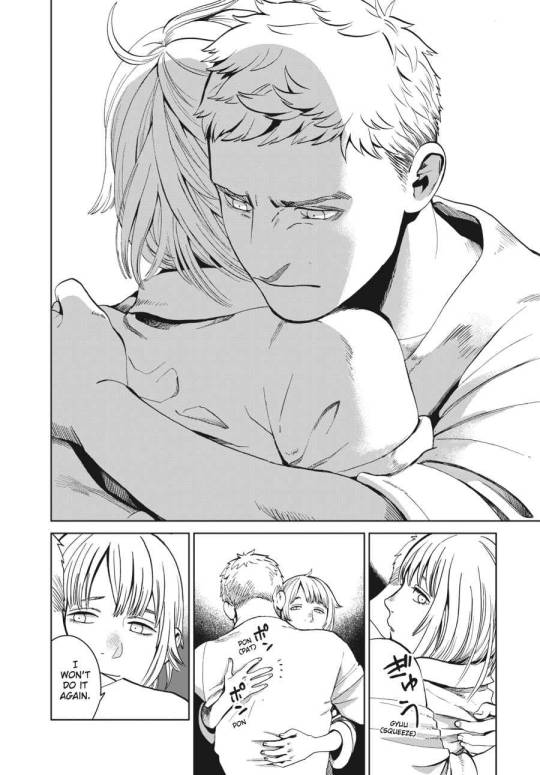
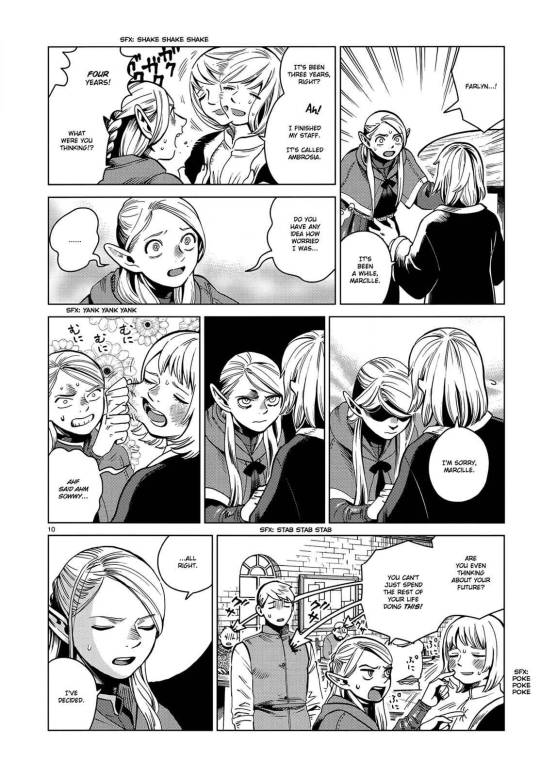
So it’s a tendency… And it’s not that she doesn’t care, it’s just that the way she measures what’s good for the ones she loves isn’t the same as what they themselves think it is (like Laios and Marcille not wanting to be apart from her). It’s an overt but quiet kind of care, it’s doing things like following them around and making sure they bathe and have a meal, even if that means she has to be dragged into misery too.
So yes she probably would know "not caring enough/the right way" is one of her perceived flaws, and that informs how she tries to handle her response to Shuro’s proposal. Her not wanting to accept like her first gut instinct, is because she’s thinking about reciprocity, about if it’d be right to go into this knowing that they have different priorities and she might not be able to keep up with the type and amount of emotions he wants/expects from her. And that’s a big part of her character isn’t it, having expectations pushed onto her. Her trying her best, but in her own way that may seem odd or even unfeeling. Not unlike when she exorcised the ghost as a kid too, unblinking and matter-of-factly, and not seeming to understand why people stared the way they did.
Even though she answered his proposal only post-canon, she’d been pondering it for a while even pre-canon and the Adventurer’s Bible explanation was released midstory, so I’m hesitant to assign her much growth about her hesitation and what I went on above, since she still didn’t react "right" with Laios after the red dragon fight (even if she apparently doesn’t remember sacrificing herself) and put herself in that situation in the first place. She hasn’t finished her arc on that flaw of hers is what I’m saying, she for sure still has it, but I certainly think her thoughts on Shuro’s proposal shows awareness, both of herself and social.
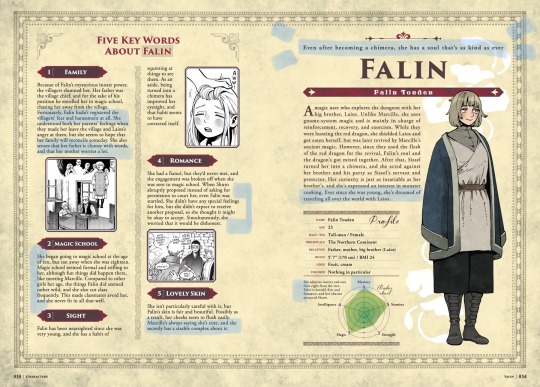
And awareness is a big analysis key word with Falin, especially here it can be hard not to conflate not caring with not knowing. How socially aware is she? It’s rather layered, because canonically she wasn’t aware of her ostracization in her hometown at all, and we’re not sure if she knew Shuro was interested in her before he proposed, but she generally seems more socially aware than Laios. She tags along on his caravan job to make sure he isn’t being mistreated (though doesn’t ask he get a salary), she catches social faux-pas more easily like in the genderbend magic mirror omake with Shuro, and interestingly enough she’s very good at empathizing with her parents and understanding their perspective. We see when she’s worried about Marcille coming that she does know about propriety and how appearances shape impressions. Being a chief’s daughter must at least have taught her a thing or two on that front.
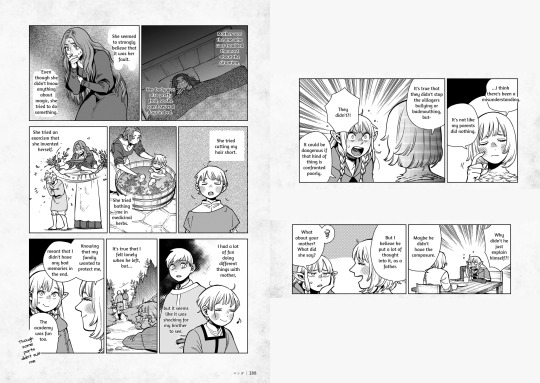
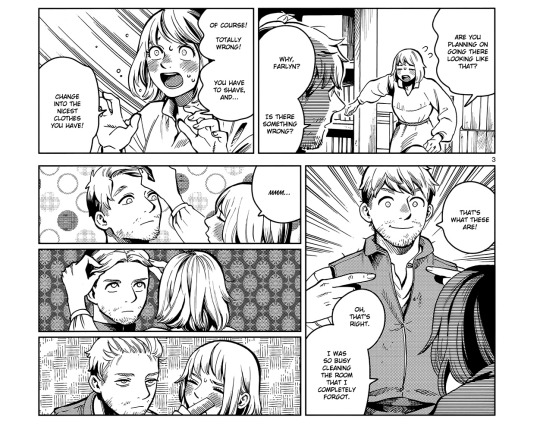
She never stands up for herself, but when it comes to defending others she worries, strategizes and explains.
And this sort of understanding is part of why I think she’d notice the expectations pushed onto her like I was saying earlier, notice how she makes people feel when she’s careless. But if she changes anything about herself in response to noticing is for her to choose, and generally I think it’s a sort of inbetween of yes and no: that she becomes more complacent but also more reserved, complying but by hiding more of herself passively. She’s not sure wether to accept or reject Shuro’s proposal, doesn’t want to lead him on? She’ll just be taking a while to silently consider it, try to keep things as they are for the time being. The third, less conflicting option. She doesn’t feel heard by Marcille who keeps infantilizing her? Just bear with it. Retract yourself emotionally. Settle for it.
We see that when she was young she had a tendency to not read a room, and I think that’s here too. She doesn’t get why her nonchalance upset others but that doesn’t change that she doesn’t want them upset or hurt, so she tries, albeit in maybe a roundabout way. She always had a hard time deeply connecting with people, often keeping herself some amount of emotionally distant: erasing herself from the equation, from the two-way trade that relationships are and making it a onesided thing instead, where all their needs and emotions are directed towards her but she only lets out a bit of her own show. She takes everything upon her and deals with it and tries not to give others this same burden, though not on a conscious level, it’s just that she’s learned growing up that she doesn’t have much agency.
Like I went into with my analysis linked at the beginning, I think Falin is used to just taking what she can get and not asking for more, when it comes to social bonds. She’ll take spending time with her mother no matter what it is they do, she’ll follow Laios to the graveyards and stick by him even when he’s pushing her away (because he doesn’t want her borrowing his book or "No copying!" or such). Her father was always distant, cold and uncommunicative, her mother was considered sick from anxiety and the exorcism attempts were the main way they spent time together, at dinner tables there were only her and Laios. The dogs picked on her too even if she loved them— And so did the townspeople, maybe that being normal to her at home is why she didn’t notice the ostracization she suffered.
She’s always been the last to be asked about decisions or what she wants, never asked to play with at recess, neither her father or Laios asked before sending her to the academy or leaving the village. At home, in the hierarchy she was considered to be below the dogs by the dogs themselves, as someone they can disrespect. Dogs learn from example and behavior, so this means Falin must have been pushed around a lot, and that the family didn’t try hard to rectify the dogs’ misconception, likely worsened by Laios regularly wrestling with her as a competition.
So for example when Falin showed Marcille food, it was her way to implicitly ask to have lunch with her without voicing that question, without daring to take up space. Someone’s presence isn’t something you ask for, it’s something that’s bestowed upon you, you can follow them around but you can’t ask them to stay or to come with.
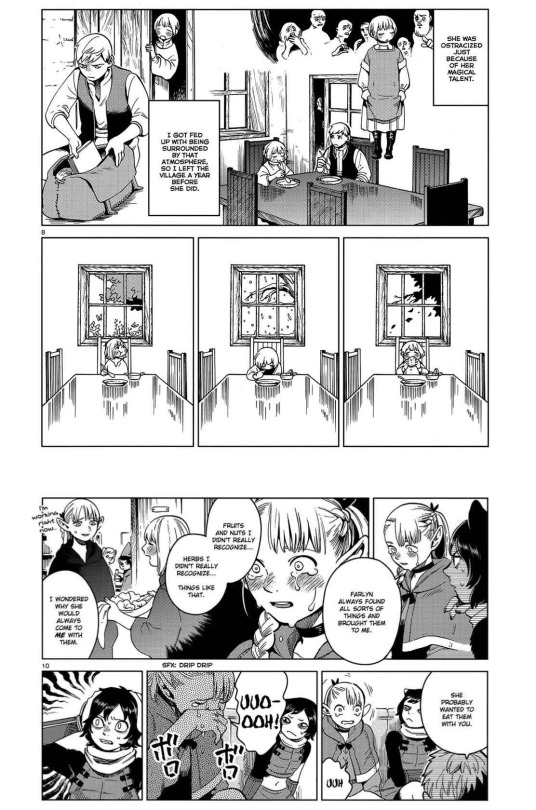
She’s used to her needs and wants not being listened to, so she’s learned to have less wants. Caring less about herself, caring less about other people beyond her safe zone, was a defense mechanism in part. She has a sense of learned helplessness too, like how when Marcille came to take her away from Laios, even though she didn’t want to leave with Marcille it felt so determined and unshakable to her that whatever Marcille decided Falin would have to comply with.
And still, it’s the "marrying you would be awfully convenient if it wasn’t that I’d feel guilty for not loving you back, the way you wanted me to when you proposed to me" and the "I don’t regret leaving the academy and leaving you behind without goodbyes but I’m sorry that you’re so much more upset about it than me". It’s the guilt of not loving people back the way they want to be, with the same intensity or fervor.
It’s the autism it’s the aroace of it all, it’s the emotional stunting and confusion but the pit in your stomach telling you you did something wrong again. The no object permanence even for people you love even for 4 years, it’s the feeling like you’re somehow at fault for someone having fallen for you and not knowing what to do with any of it. I’m not joking btw it isn’t uncommon for autistic people to not see their close friends for a long while, not having missed them all that much and for that to be really hurtful for the other if they notice/ask about it. "Hiii bestie! Oh umm you’re uh more emotional about this than I expected, hopefully you won’t feel alienated by me not feeling as intensely about it…"
So… Yeah. I think she thinks of things and relationships in a different way than most people, and beyond "good things happening to people is good" I don’t think she actually cares about people all that much. I’d argue that Laios shows more desire to connect with others and make relationships. And just like with Laios and his own issues with humans, that doesn’t mean her kindness is a lie or ungenuine or worthless! It just means that like, well it’s pretty straightforward really, she’s not all that social and doesn’t see casual bonds as meaning all that much and whatnot. She does want to see people happy, but it’s not as much like… A conviction or goal. She’s too laser focused on a select few people. "It’s not that they’re bad people, they just aren’t interested in humans."
And sometimes it feels like people get defensive about Falin in a meta way too, like if you ever so much as imply Marcille isn’t her whole world or that she isn’t the kindest soul out there then you’re saying she doesn’t care at all or she’s evil. And that’s actualy exactly the sort of vibe I wanted to get through with my analysis above here actually haha, that she does care and she is kind but it’s not in a way that’s quantified or understood in a way that makes people feel comfortable. In a way, that makes people feel insecure because they don’t have the same logic as her, don’t show love the same. And I think this is another stellar depiction of autism, of parts of it that feels unpalatable to many, if I’m making sense. The fandom idealizes her as well, which isn’t uncommon or surprising for the character embodying the trope of the perfect beloved to rescue.
And disclaimer, as I said in the tags I feel like the details of Falin are pretty vibe based when it comes to analysis, there’s absolutely a valid angle where she does super care about everyone always, feel free to disagree with me on the overarching angle of my analysis. There’s enough supporting evidence to tip the balance either way I think, and the reason I’ve chosen this angle is I feel it’s more compelling for the themes in Dunmeshi of idealization and being different, of desires vs wants, and because I think it neatly ties up Falin’s character arc as I’ll go over throughout the next section…
So.
Not feeling as much as she should. And……. Is this not Faligon pushed to the max?
You can’t tie down a dragon. As the chimera, she gets to just not care about everyone else and be on her merry way.
Part of it I think is finding comfort and freedom in the mindlessness, in not having the burden of feelings and connections and a consciousness (despite still ending up seeking those in a stranger, Thistle). Like when she’s dead in the purgatory as well, she gets to just… Hang around and do whatever. Similarly to when she played in the forest instead of going to class in her academy days. That’s what freedom and peace of mind looks like to her. Why she decides to roam post-canon, if only now with the goal to find herself instead, with her mind in tow and somewhere to go back home to.
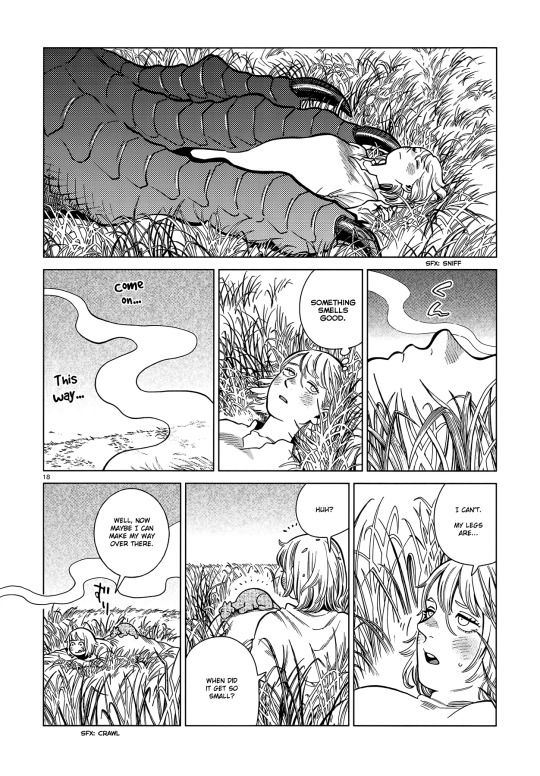
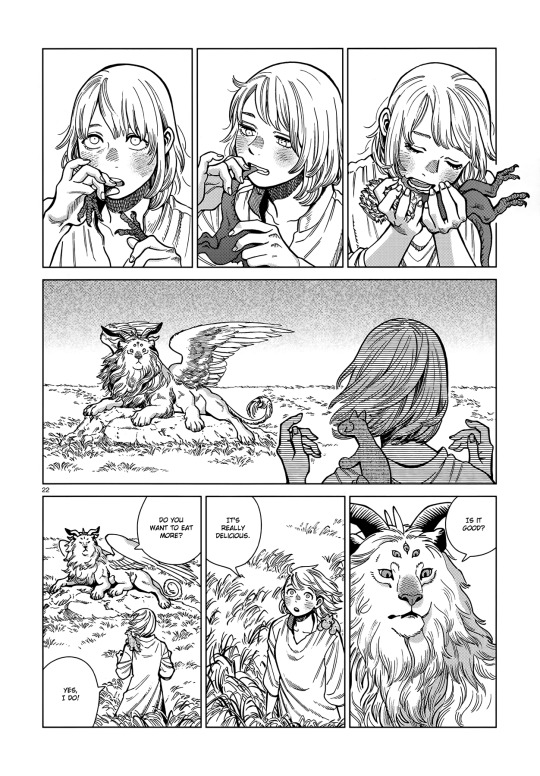
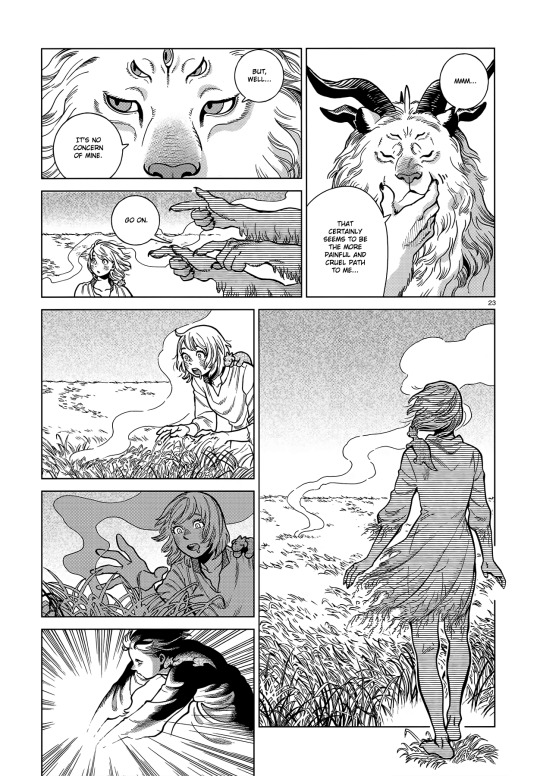
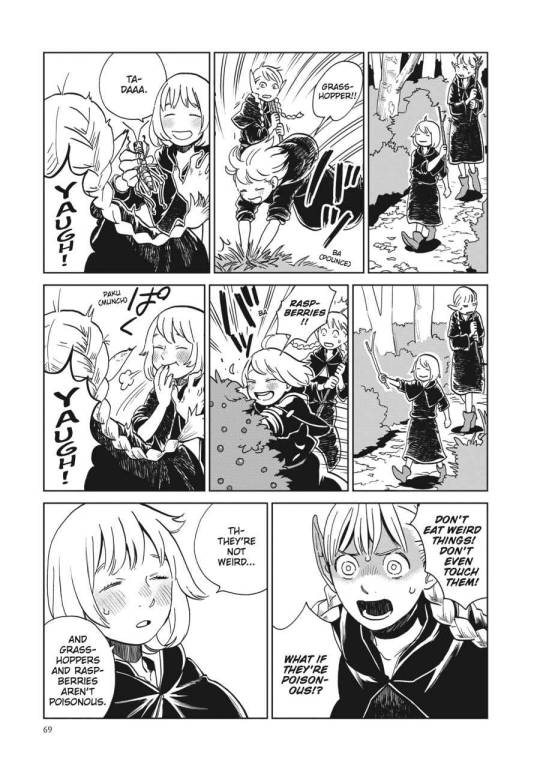
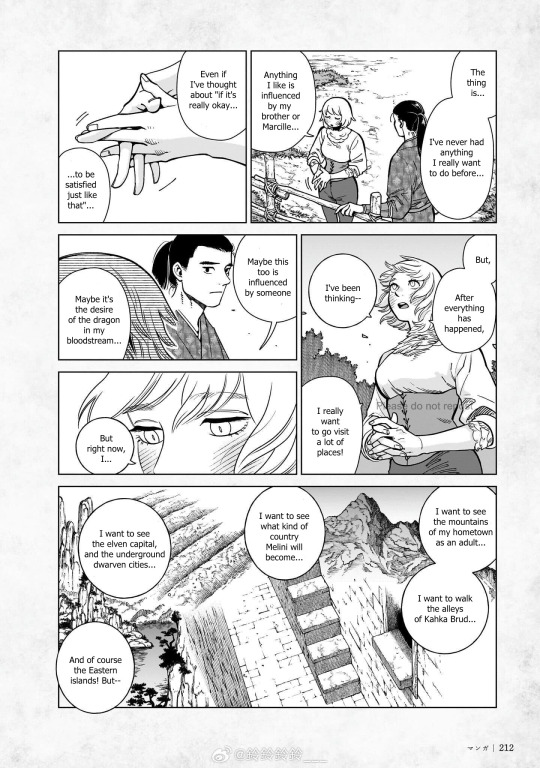
There’s excellent analytic framing out there about how of course, Dungeon Meshi has a big theme of grief and letting go, and… Falin was always a symbol narratively, idealized by characters and often underconsidered by them despite their love. It was Falin’s choice to sacrifice herself for Laios, she thought it was worth it, knowing that it would be her end. Her resurrection and the process of it intertwining her soul with a dragon’s wasn’t done with her consent, and the subsequent opening it gave her to become a chimera puppet. She’s stripped of her agency consistently, and so… It’s very noteworthy that the final choice, of wether to go back to life or to stay dead, in that purgatory scene, was up to her. And she chooses life, but I do think about her in those fields and how at home she seemed there. Peaceful, by herself in a vast calm expanse she could explore, free.
Personally, I think freedom is Falin’s own subconscious selfish desire. And though to us becoming the chimera is obviously a shackle, I think it felt like freedom to her somewhat, too.
And if you think I’m going wildly off the rails here I want to talk about Laios’ wish of becoming a monster. And to be clear before getting into it, being mentally a monster is absolutely a big part of the appeal for Laios, it’s something that’s consistently referred to, something especially pointed out in the werewolf monster tidbit with Lycion. Right panel is from that, but left panel is from the extra with Izutsumi where Lycion talks about suppressing souls in a beastkin body, the human or the beast soul.
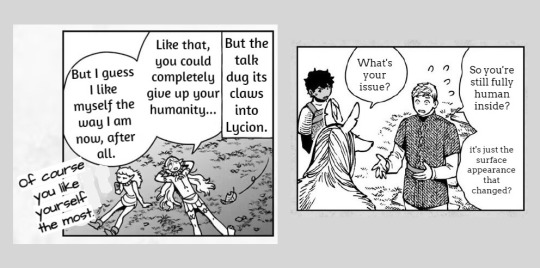
Finding comfort and freedom in being mindless, less sentient, less aware? While being unaware in her hometown might have saved Falin a lot of heartache although perhaps stunted her emotional growth, it’s always been Laios’ curse.
Actively, through his choices, he seeks to grow closer to people, to form deeper bonds, to understand and be undertood, but… On a deep seated level, what he desires is to leave humanity and civilization behind. He has an irrational hatred for humans, born from the trauma of ostracization, being different, being beaten up and rejected consistently through his life. Running away from problems is easier. He wants to be free from being a social animal from a social species who has deemed him the black sheep, he thinks it’d be simpler to just leave it all behind, people and his own humanity. At its core, to Laios becoming a monster is a power fantasy, a coping daydream of "if only I could be strong enough to never be hurt again, the power to destroy anything I want, the power to go somewhere better, if only it was possible for me to never feel hurt again. If only I could be someone, something, that can never be hurt". "If there’s someone you don’t like, you can gobble ‘em up in one bite. If you could fly, you’d be able to leave this village right now." It’s a childhood fantasy, from a deep sense of being misplaced and a desire to be able to stand fearless, thinly covering up resentment that Laios represses.
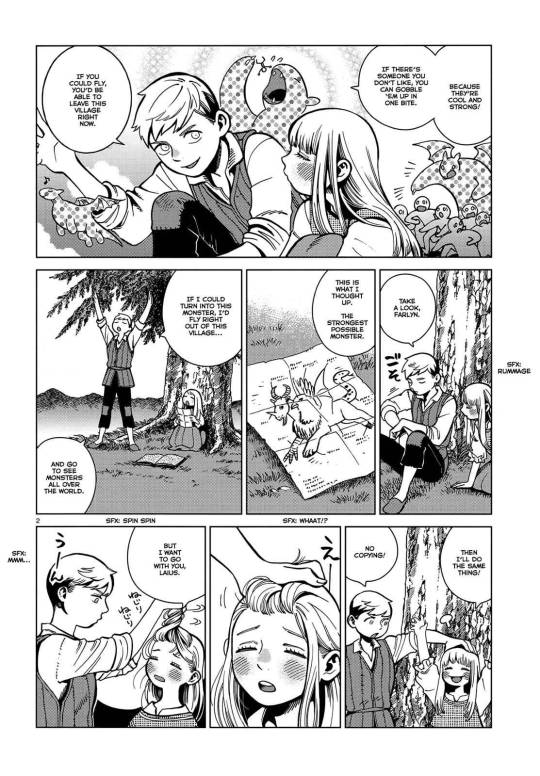
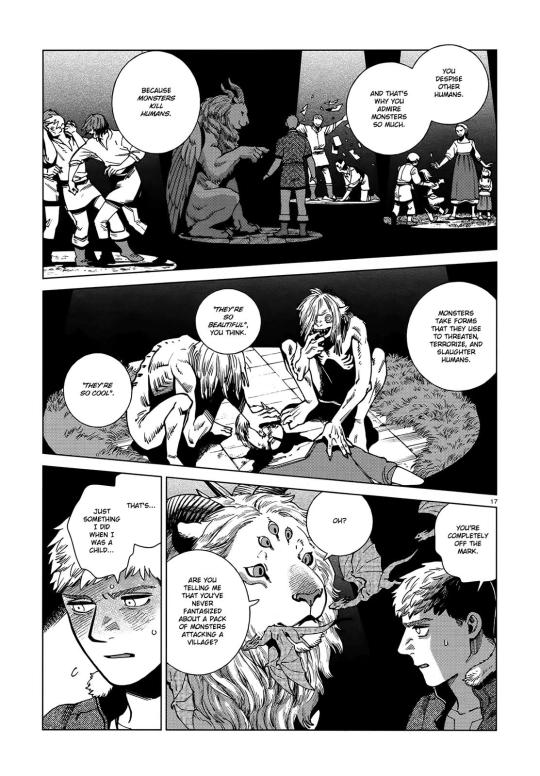
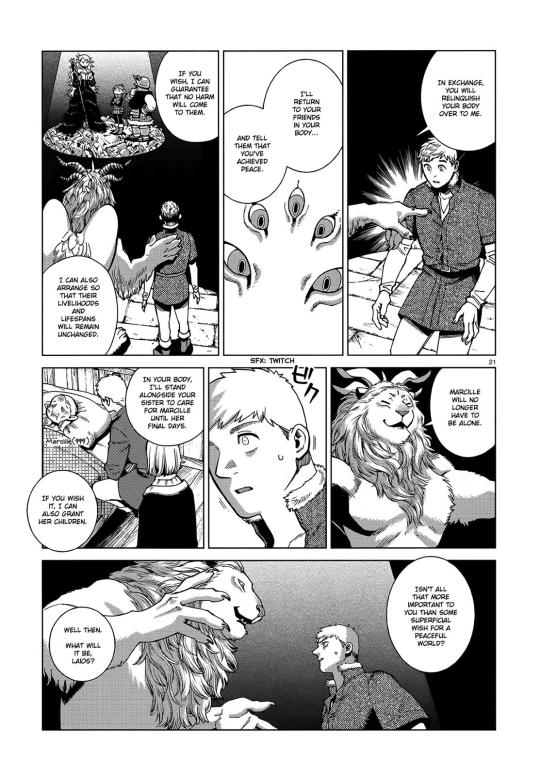
But you’ll notice, when the Winged Lion is enticing him in the last page, even now with his lifelong wish of becoming a monster on a silver plate, he still cares about his friends. He still has that sense of responsibility to his friends, doesn’t want to leave knowing they’ll be in danger and alone. The offer that his friends may be left unharmed is already good, but Laios also visibly flinches when the Winged Lion offers to specifically care after Marcille and rid her of her biggest fear. Laios’ care runs that deep. Not unlike with the succubus, he resists temptation until he gets reassured that everyone will be okay. But see, what he desires isn’t to stand alongside Marcille until her last days, it isn’t to stay and see how well his friends will live, it’s to go. It’s to leave. It’s to fly away, a monster both in body and mind. He wants to be free from caring here, wants to not have to worry about his friends, wants to just go do his own thing, but for that he needs to feel safe in the belief that said friends will be safe even without him being there to see it, because despite everything else he cares, he does. It’s again that dichotomy about caring and wishing you didn’t, or not caring and wishing you did.
In the end, it’s Falin who achieves that wish. Both by becoming a chimera during canon, and by going traveling post-canon. In the latter, being both free of human relationships as something chaining you while still being uplifted by them, by the knowledge that there are people out there you love and that love you. It’s a theme that can also be connected with Marcille, because she gets anxious over people she loves getting out of her sight, worrying they’ll get themselves killed, that time is passing while they’re away from her. But before she can get to the point where she can both have her freedom and being uplifted by her social bonds, regaining both her individuality and her connections, she has to get a taste of just one at a time. Before they can find balance in her life, she has to see what it’s like to have what she’s never had on its own. Unapologetic freedom, and power.
No one can blame you for not caring enough or caring right if you’re a fricking dragon!!!! You make the rules when you’re a beast and you can just… Fly away. From anywhere, from anything. And if a dog bites you you can just crush it. Instead of being pushed around by the dogs because you’re at the bottom of the hierarchy, you’re now at the top, the one with the power to be heard and do what you want without consequences.
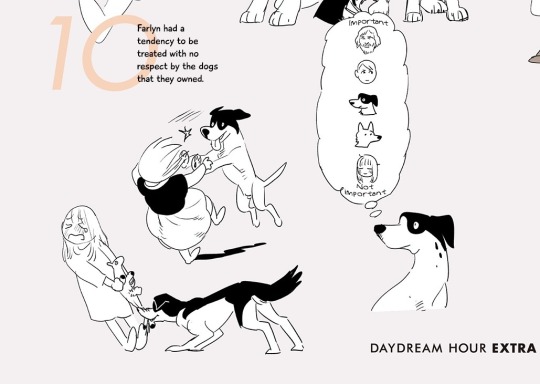
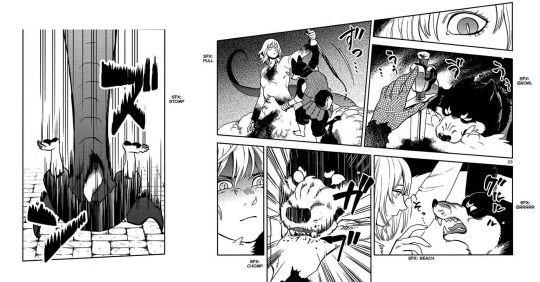
I think she’s on autopilot. I think she’s on autopilot a lot of the time, even before being a chimera, and it’s partly why her will is so weak compared to regular dragons. (Again, read my shorter analysis.) It’s familiar to slip back into the role of following someone around unquestioningly. And that’s what is weaponized when she’s a chimera, that instinct she’s been nursing all her life to unconditionally support, defend and follow someone. Only now, that someone doesn’t matter in itself, only the symbol of it. She doesn’t mind, either way is fine. Her will is weak after all, because she’s trained it to take as little place as it could.
Falin cares too much
She spends all her time caring for Laios and Marcille alternating that none of her care and emotional energy is left for others, including herself. So she had to get relieved of all of that for a bit, becoming the chimera so she could reset and recenter and remember that she, too, indeed, is there and an important part of her own life.
So you’re probably seeing the duality I’m talking about here, Falin is very self-sacrificial but for specific people in ways that they often don’t recognize or appreciate. She cares but selectively, both in people, putting all her eggs in the same baskets, and in the ways she cares after them. She doesn’t care a lot, but when she does she cares a lot. Falin doesn't have a lot of earthly attachments, but when she does, they're her world.
In canon her arc, especially post-canon, is to grow beyond Marcille and Laios. Her caring for her close loved ones held her back from looking after her own self-fulfillment needs. And this is what I mean when I say she cares too much; she could gain from caring more about the world besides Laios and Marcille, both lands wise and people wise. She cares too little, but her arc centers her flaw around caring too much instead. Her pitfalls that Kui highlight over the course of the story, while of course her selflessness is appreciated for how she saved Laios and everyone, on a personal level is shown to be self-effacing and damaging. She’s undermined by Marcille, without the courage to voice her thoughts and wants, she would dedicate her whole life to Laios. And I mean, it’s text, in the response to Shuro’s proposal extra no less. And she’s so laser focused on her most loved people that she’s fine with being callous and risking others’ lives, even.
Post-canon, she needs to leave to find herself, away from them.
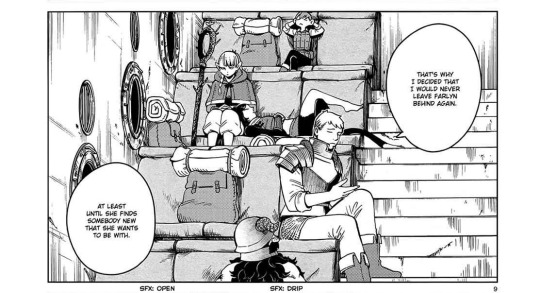
Herself. What if she wants to just be with herself for a while.
And this is me reaching but I feel like, not unlike Izutsumi who learns to feel this sense of never being alone, always having someone on your side what with having two souls, the dragon in her would make her consider herself more. She finds it easier to care after other people after all, and in the purgatory fields sequence she takes care to bring the bit of dragon left with her… Not unlike with Izutsumi, having two souls forces you to think about your identity and figure yourself out. Besides being this sort of duo now, where if she wants to care after herself she can channel it to that other side of her too… In meta dragons are symbols of greed, and I think the bit of dragon would push her to want more and listen more to her desires, primal and self-serving as they might be. The dragon soul which warped her human body with feathers and draconic features, her image of perfection marred, her weirdness externalized in a way that’s not palatable. But she doesn’t care, about if her appearance is palatable for most people, she hasn’t for a while now, and that’s great.
Notes & nuance
I’m struggling with the structure of this post, making my points organized, concise and strong at once. It’s difficult to make any statement without going "things are generally like this, but there’s this time that this contradicting thing happened too" or "it’s ambiguous enough that you should just follow my interpretation for the time of this analysis" haha, so this is the pit where I put all the stuff that wouldn’t fit well in other places but are interesting for Falin’s character. This section is pretty separate from the main thesis of the post, it’s just more Falin observations. The post has reached the 30 pics limit so I can’t just pull it up whenever it’s relevant but I really encourage scrolling up to read the stuff I highlighted in her Adventurer’s Bible profile if you haven’t already.
I think with the shy-looking loner type autistic kid archetype, and knowing she didn’t seem to mind others ostracizing her, it’s easy to lose sight of how she was by no means an unemotional child. In all the bits we see of her as a kid she’s bursting with energy and emotions. Canon confirms Laios leaving the village did affect her and make her lonely and she cried a lot, too. She may not be social in the traditional sense, but she was clingy with her brother, and she also never was all that shy about who she was, wearing her heart on her sleeve.And okay. Okay okay okay. Speaking of appearances. About what I said of her not caring about what people think of her, even seeming defiant with the caravan leader… There’s one istanxe of her caring actually, and it’s about how her face blushes easily. I remembered it as being because Laios’ said it and as I rambled Laios’ words are her world, but actually it’s ambiguous. It’s only Marcille imagining up this scenario where Laios says Falin looks weird because of it, there’s no evidence Laios said or thought that at any point. And on the other hand…
Her Adventurer’s Bible says: "5, Lovely Skin. She isn't particularly careful with it, but Falin's skin is fair and beautiful. Possibly as a result, her cheeks seem to flush easily. Marcille's always saying she's cute, and she secretly has a sizable complex about it." The phrasing makes me think the complex she has over her blushing might have developed because of Marcille more than Laios. "Marcille's always saying she's cute, and she secretly has a sizable complex about it." It could be related to how Marcille gets swept away and infantilizes her, calling her cute wanting her to wear cute feminine outfits etc. Again this feels like it relates to Falin’s struggle to be seen for who she is and what she wants to be seen as, her struggle to be recognized, having ideals and perspectives pushed onto her. Here Falin is insecure over her blushing implicitly because she doesn’t like being called cute over it, but that’s not how she wants people to see her. She doesn’t want Marcille to always see her as her 10 years old adorable friend. Like if your friend said you had puppy energy, it can be flattering, but it can also make you insecure.
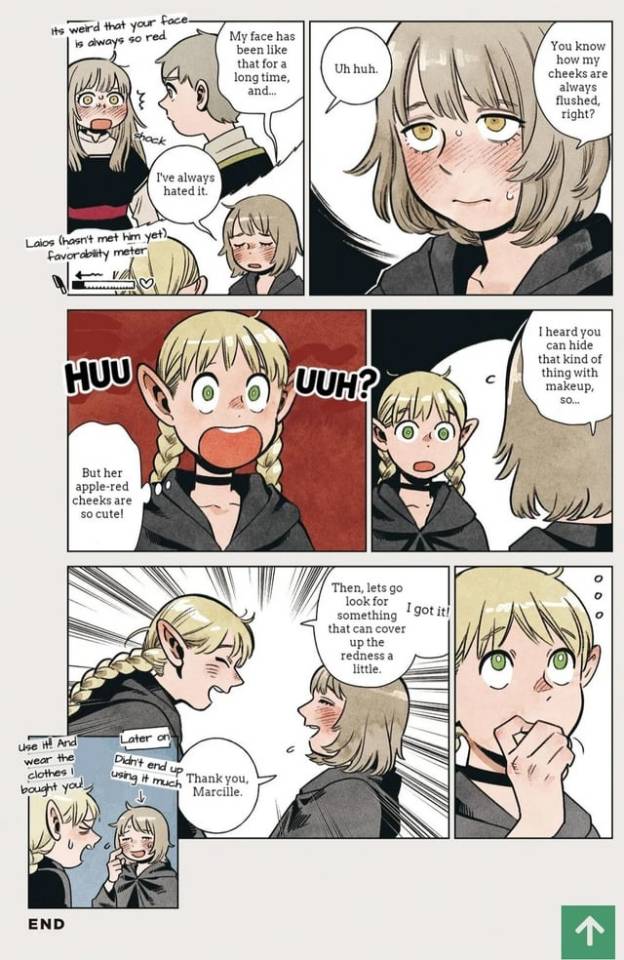
Here’s a link to what I mentioned about her being uncomfortable wearing feminine outfits. It does seem to be more about comfort than the aesthetic perse, to me. Interestingly the shirt & shorts don’t seem like they show much more skin than her beach outfit, so maybe it’s more about the shirt and shorts being tight-fitting. Like the skirts and heels they feel stifling. Again a bit with themes of freedom and not wanting an aesthetic pushed onto her. So yes just to reiterate, I think this is more about self-affirmation and how her identity and self-image gets shown to others, rather than wishing to hide parts of her body like her blushing etc for people pleasing reasons. Makeup was a way for her to appear how she wants to and feel more confident. It was a way to take control over her own image. She didn’t keep doing it, the narrator stating the process to be ‘troublesome’. Ultimately she still prioritizes her comfort, and it was a lot of recurring efforts to go through.
And on the topic of appearances… A friend once asked me: "Does she really hide herself or not? I keep thinking about "falin is herself first and foremost" (in her Adventurer’s Bible profile) it’s just so. Hmmmmmmmm... I just keep seeing people say she hides her real self from people when I feel like the issue is more about her charitable traits straying too far into becoming flaws but people around her dont realize that..."
Imo the thing is, I don’t think she hides her identity, but I do think she suppresses her individuality for others’ sakes if that makes sense. In the way that only post-canon does she allows herself to go see what the world is like, but that’s not personality wise it’s needs and wants wise. And I do feel like that’s the closest interpretation of canon, she says it herself she doesn’t know what she wants because everything she’s done was always about Laios or Marcille, but she doesn’t change her demeanor or personality for others. But she *will*, like, not ask for things she wants directly, like sharing lunches with Marcille at the academy, she suppresses her wants, doesn’t ask things from people and doesn’t hope for more, hope for better. I don’t think we ever see her actively repress her personality, except like what, being more laidback than enthusiastic but I do feel like unlike Laios with her it’s less ‘appearing stoic to fit in more’ and more ‘yeah i’ll just chill until I’m needed or something activates my enthusiasm’. To which said friend quoted: "to feel like you belong you need to be useful. when you can’t be useful the next best thing is being convenient."
And speaking of passivity… I want to speculate about Shuro’s proposal some more. Shuro and her got along well though we don’t know how much, or how often they hung out, she even saved him from a nightmare. Why did she take so long answering Shuro’s proposal? Was it an effort to preserve or was she really just that conflicted? Procrastination probably yes, but what is the core motivation of itl Considering she ended up saying no to travel the world instead, I don’t think it was as simple as ‘she wanted to say yes for convenience’. Logically it’s what would have been best, but it’s not what she wanted for herself, but it was and still is hard for her to even know what she wants. Probably, since like she states it was a great offer and she doesn’t think she’ll get proposed to again, it’s that self-effacing tendency that yes it’d be convenient and logical, and that makes her want to say yes even if her spirit isn’t in it, because if it’s convenient then that’s more important than her feelings on the matter. Man also… Obviously Marcille is very vocal about how she shouldn’t get with Shuro, but imagine how Falin’s whole perspective on marriage must have felt when her only friend ever is a Romantic with a capital R who gushes about idealized romances and grand gestures and True Love and doing things with fully pure feelings all the time.
AND speaking of passivity!!! How much Falin is "there" as the chimera, just how much she’s master of her actions, is left ambiguous and intentionally so imo, but she’s for sure there & influencing the dragon’s action to some degree. Having a dragon’s foot on her in purgatory that keeps her from moving for sure visualizes how it must have been like, but there’s Falin calling out to her brother Laios, there’s the kind attentions towards Thistle that are so Falin-like, and most explicitly there’s the Adventurer’s Bible stating "Even after becoming a chimera, she has a soul that's as kind as ever", which I honestly dislike, a fantranslation puts it as "Even as the chimera, her caring nature remains" and either way to me it feels like confirmation that it’s her giving those berries to Thistle. Now, wether or not she has the mental capacity of a chicken or something closer to human Falin, no clue, there has to at least be some kind of mind bond between monsters and the dungeon lord, compelling or forcing them to go along with orders, or calling her to him in distress like with the fight on the first floor. But yes, it’s interesting to wonder what it is that a Falin, with her kind soul but without her human mind, would willingly do. On her profile, she’s described as Thistle’s guardian and servant. The power dynamic between the two are very interesting, I already went into how it might have felt like freedom to her while being fake so I’ll reign myself in and just mention it again. She’s still at the heel of someone, only now it’s someone who doesn’t care about her back. Going from being cared for so strongly that it’s suffocating and they would defy death and the world for you, to being devoted to someone who has not one feeling about you besides your utility as a paw . She has all this care to give and to focus onto others and he has none to send back to her and I think that’s part of it. In a way, being left with only her own feelings and a void, without expectations or feelings or ideals pushed onto her, it might have been soothing in itself, and eye opening. But yes the way I think of it, her care for Thistle isn’t unlike the care she gives the ghosts.
Interestingly, the care she extends for the ghosts is sending their soul to a peaceful death, freeing them, of life and any earthly attachment. Take that as you will with the themes of freedom and burden of life and mind, immortality and becoming a warped version of who you were, and such and such.
But going back on the topic of connections and bonds for a bit, I think academy days Falin & Marcille is super interesting bc we’ve never really see Falin form a connection besides with Marcille and even that is kept pretty ambiguous. When was the point that Falin started seeing Marcille as a friend and seeking her out? When was the "I’ll lay down my life for you" point? I’m so fascinated by how she wanted to share lunches with Marcille but never truly asked, only made little "hey want this? I found it isn’t it cool?" gestures of showing things to her… It’s the only way she knows to ask, or maybe it’s the only way she feels comfortable to. In all the scenes of young Falin and Marcille Falin seems comfortable in her friendship with Marcille, but at the same time… I think we see Falin at her most insecure around Marcille, because she really does care about Marcille and what she thinks of her so much, and while Marcille is a bit of an unstoppable force tornado style (affectionate) Falin is something of a doormat. I’d usually say showing her berries was her earnest way to connect and be like "Hey bestie look at this! :]" , but there’s a real possibility that she was self-conscious and holding herself back.
Friendship and Marcille! Involving Laios into this too but, again with the autism thing of not showing you care in ways that others understand, Marcille being very overtly affectionate and clingy was so so soo important… Marcille keeping on hanging out with Falin and caring after her, and being undeterred/unbothered by Falin not always seeming like she cares all that much back in the conventional way, as in Falin acts nonchalant and a bit like she didn’t mind wether she was there with her or not during her outings to the cave dungeon. Caring and being clingy and so affectionate despite that in such a classic Marcille way is soo needed, because so often people will get discouraged by say, their friend not keeping in contact regularly/well, seeming disaffected or as happy-go-lucky as ever even if you haven’t seen each other in a while or when they’re alone, and yes there’s potential for a strong friendship there but someone like Falin won’t be committed enough to reciprocating attention the same way… I hope I’m making sense but yes this angle in particular strongly correlates to autism. And the way Marcille always initiates physical affection, both Toudens being awkward about initiating touch because they don’t know if that’s allowed, if they’re going about the social interaction the right way, if they’re allowed to ask that out of someone…
Another fun observation to make is about the 4 years Falin and Marcille spent apart. Marcille despite being of a long-lived race treated these 4 years of separation with more gravity than Falin did. Falin brushed it off very dismissively to say the least. But then you remember that the amount of time Falin and Laios didn’t see each other after he left the village was 8 years. Double the years, double the time. And that reminder makes Falin’s actions so starkingly understandable. Of course she wouldn’t see 4 years of separation as a long time if 8 years of separation with her beloved brother is her point of comparison. Of course she’d see it as worth it to leave Marcille for 4 years if it meant ending those 8 years instead, especially if she was worried about him (the reason why she followed him into his caravan job).
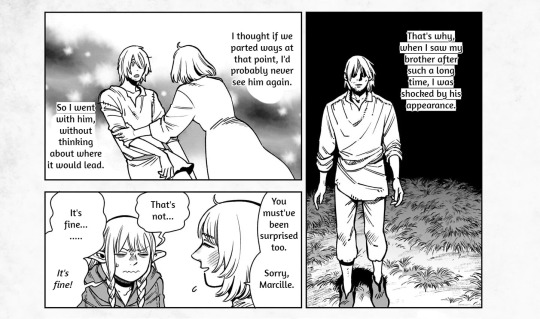
A friend always says that while Falin is the center of Marcille’s world, Laios’ is at the center of Falin’s, and I tend to agree.
It’s fun to think of how her career dreams had always been shaped by Laios, even when they were kids. Of course there’s how traveling the world began as a dream they talked about and shared, but there’s how he reassures her by listing cool jobs she could do like traveling exorcist, etc. And then of course, she gave up on her magic academy and career path to follow him and do odd jobs, etc etc.
I should go into the violence of Faligon more tbh, because I think there’s an interesting parallel to how she has no problem wacking things with a mace, wether a ghost when she was a kid or a walking mushroom as an adult. Something that often surprises fans when they remember, I don’t really want to get into the whole " Falin hates violence and hates seeing people in pain to an intense degree. ‘If you die do it somewhere where I can’t see’ style’ interpretation, it has some weight but on the whole I don’t vibe with the theory she has a particular aversion to violence, she seems to be fine resorting to it as much as any other adventurer as long as it isn’t needlessly against ghosts. And Falin’s sudden mace hits are fun to me too because it’s not her becoming a berserker when the need arises as much as her becoming active because something she cares about is threatened, and that brings her out of her passivity from 99% of the rest of the time. Thistle included. Falin always could be violent, she just dislikes senseless carnage. The Shuro party vs chimera fight is a bit ambiguous on it, because you can argue she only attached after being provoked, presumably offscreen as well while the ninjas went off to fight the harpies. Falin becomes the most active when she needs to protect someone, she has no qualms doing whatever’s needed for that, wether it be leaving the academy & Marcille without notice no matter the consequences or what her parents think, or teleporting the party, etc.
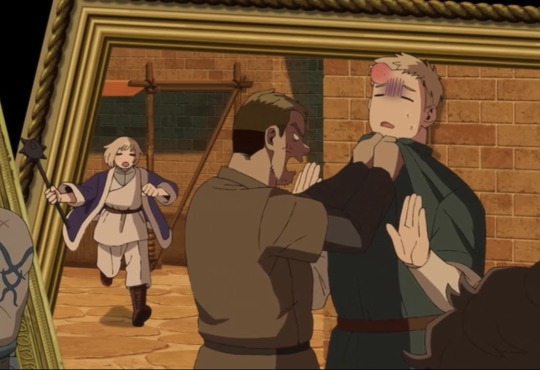
I’m working on a post specifically pointing out all the differences between Falin and Laios, but yes I think both of them selfishly desire freedom in different yet similar ways. Falin’s dark secret is "Ethics and risks are optional if it means I can protect those I love" like the teleportation, and Laios’ is "Ethics and risks are optional if I can be free of all this bullshit" aka humanity aka his wish with the winged lion.
Conclusion
Flighted birds have hollow bones. With freedom and wings there comes risks and sacrifices.
Tldr: Falin doesn’t care all that much, she’s very go with the flow. For example if someone hates her she doesn’t really care because that’d require her caring about what they think of her in the first place, and she only cares about her loved ones. She smiles, but it’s more a state of being rather than out of active goodness: she’s canonically very genuinely kind, but it’s more out of a general want for pleasantness than active care itself. She’s passive, and softspoken because that’s just how she seems, but she has no problem hopping into bushes or getting heated if something calls to her enthusiasm or calls for action and a hit of the ol’ mace. Her loved ones needing tending or protective is what makes her go from passive to active. That familiar autopilot mode of making someone the center of her world and following their every move is what made her so easy to be controlled as the chimera, even ferociously defending him with her life. Faligon is most interesting to me with the theme of freedom. She’s shackled to Thistle and out of her mind, but there’s also a sense of empowerment and freedom from expectations and society. She spends all her time caring for Laios and Marcille alternating that none of her care and emotional energy is left for others, including herself. So she had to get relieved of all of that for a bit, becoming the chimera so she could reset and recenter and remember that she, too, indeed, is there and an important part of her own life. There’s a way of caring after others that can be selfish, not unlike Marcille being overly coddling and not listening to Falin. In Falin’s case, I think it was so selfless that it ended up looping back around to erasing her sense of self. In losing sight of herself, that devotion becoming neither quite selfish or selfless but a fact of life and a state of nature, muddled by its lack of direction.
She’s sooo used to never being able to ask things out of others, you get the crumbs of affection and approval that others offer to you unprompted and that’s it don’t hope for more don’t ask for more. (Also reflected in how she follows her loved ones around without complain or personal opinions and how she’s not willing to rock the boat and affirm herself in her relationships like with Marcille during canon)
Falin cares so much, so much and so laser focused on her few loved ones that it blinds her and she loses sight of everything else, she ends up neglecting herself and the rest of the world. As Kui puts it, Falin is herself first and foremost. She just had to remember the importance of that.
-
I see her as an enneagram 9, which can be surprisingly accurate and fun to research through the lense of Falin. Excerpt below from this book, but like my god, good way to put it
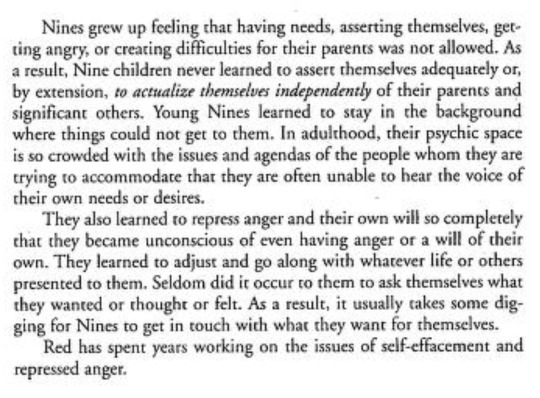
That’s it, ty for reading. Even if it’s a bit of a mess, hopefully you’ll have gained a thing or two from it. Falin is a character hard to pin down, but it is very gratifying when you find the way that the puzzle pieces fit together right for your own understanding of the story. Fantranslation of the shuro proposal comic by @/thatsmimi here.
Here’s my spotify playlist for her if you’d like
Sometimes love is about letting go, a lesson a lot of the cast needed to learn. Self-love’s important too, and just like with diets we need a healthy balance.
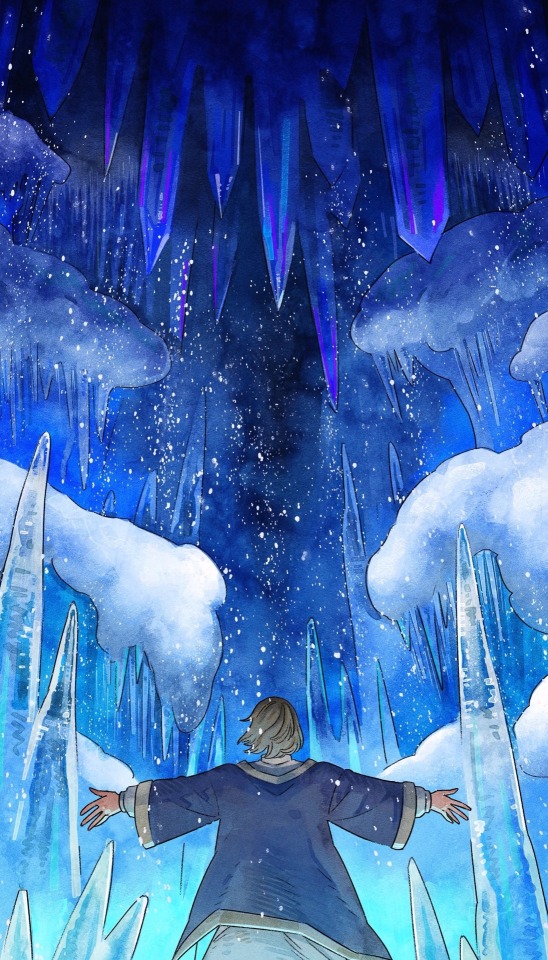
#I find it hard to express myself right on the topic of Falin. Both because the issue is pretty vibe based and because we don’t#get that many moments with her. So there’s ambiguous scenes up to interpretation addressing a layered topic and like. Save me. Save me#As always falling down the rabbithole of starting an analysis about a specific facet and then needing to explain everything else around it#I’m doomed. I’m getting lost in the sauce.#dungeon meshi#delicious in dungeon#falin touden#analysis#character analysis#meta#autistic reading#aroace reading as well. Sort of. It’s mentioned#The aroace autistic guilt of not caring back in the way/with the intensity you’re expected to#As always this is just my interpretation blablabla#Spoilers#dungeon meshi manga spoilers#She loves like a dog aka unconditionally and happy with eating scraps of affection and attention off the floor#Laios touden#he’s here too bc they are an unit#If you’re not capitalizing on the uncanny vibe autistic effect for Falin’s character u are missing an opportunity imo#Fairy’s child is written all over her. Her cryptic-ness is the point so why am I surprised she’s hard to fully pin down#Even with the graveyard scene it was Falin following Laios… Sob. Laios could feel responsible her powers were found out#I’d like to rework this at some point if i get better at structuring. I’m not satisfied by the level of clarity#Will 90% for sure edit stuff in if i find more to say.#Fumi rambles#Crazy style#I give a TLDR at the end if you’d prefer. It doesn’t have the like evidence/explanations alongside but it makes the main points i think
1K notes
·
View notes
Text

"Children in the woods" 1/5
<- Previous \ Next ->
#art#digital art#fanart#comic#crk comic#crk fanart#crk#cr kingdom#gingerbrave#wizard cookie#strawberry cookie#the snatched up trio#yes this whole chapter is wizard cookie just rambling about a stick#is it important lore or plot stick? probably no#I just really wanted to have those three interact#that kinda is the starting point that inspired this little thing#so now everyone gets stick talk!#I'm myself no stick knowledge master#so info was taken from the great place of sources - wikipedia! genius#sorry for any errors in the text#english not my native.. but more importantly I'm too lazy now to take a third look so...
149 notes
·
View notes
Text
i feel like poolverine easily could’ve been one of those “they’re flirty but it’s mostly unserious” situations, and for most of the movie yeah they were extremely gay, but wade’s been like that with other guys and it was never treated as a serious type of relationship before. they’re willing to die for each other, but even then the romantic aspect of their relationship could be glossed over because it’s a superhero movie, that’s just what they do, and they’re working together to save a whole timeline—it’s not just about them. but then the movie doesn’t end with them saving the day and moving on. i think this’s really the part that sells poolverine as a genuine relationship to me… logan’s leaving, and wade calls for him. he can’t stand to let him go. then he introduces him to his family, and logan stays. he doesn’t really need to stay, but they’ve both decided they’re better off with one another than without
#don’t get me wrong#wade and vanessa are going to end up back together again if there’s ever another deadpool movie#and then he’ll lose her again for whatever reason#because that’s just how it goes#ignore the fact that logan tells wade to talk to vanessa and i’d be convinced that the ending was supposed to imply them being canon tbh#not gonna delude myself into believing poolverine will ever be genuinely and seriously canon#but shippingwise#i think this’s why i’ve latched onto poolverine despite some of the similarities between cable & logan#with cable it was never gonna be serious#despite it being fun to ship them and enjoy their dynamic#but#with logan… storywise… it makes so much sense for them to be endgame#they both were at terrible points in their lives and really needed each other#not just to fix each other’s problems. but they needed someone who was so on their own level that they could fix each other#not in a healthy way. but#yknow#anyway#idk i’m kinda rambling about nothing here#deadpool and wolverine#deadpool#wolverine#wade wilson#logan#um#logan howlett#<- ….i guess#poolverine#deadclaws
502 notes
·
View notes
Text









wanted to play with how blaze would fit into stc, so I finally got around to watching a longplay of sonic rush. i hated it. the writing made me so mad. so here's a couple fleetway blaze doodles and a LOT of "here's how i would fix this story" doodles
#sth#sonic the hedgehog#blaze the cat#fanart#cream the rabbit#amy rose#knuckle the echidna#id in alt text#doodles#not tagging feebay bc really this could be ANY mean sonic... who's to say!#i keep starting and stopping myself from rambling about all the problems with this story#bc at a certain point i just keep circling back to: this is elise's story in 06 and 06 did it better#everything wrong with rush is fixed in 06. they just did blaze again but did the story right that time#so instead i'll just explain that knuckles was ooc as FUCK he would NOT tell blaze to trust sonic with the emeralds#and cream needed to be doing something that was not just. forcing herself as blaze's friend.#she needed to like. just be trying to help someone who needs help rather than annoy her into accepting the title of friend#posts in the night time when all the notes are sleeping ^_^
304 notes
·
View notes
Text
Something something Clone Force 99 breaking binders in every season finale



#idk man i just thought of it and it felt really significant thematically#maybe i’ll write an essay#or maybe someone smarter than me should do it lol#the bad batch#star wars#tbb season 1#tbb season 2#tbb season 3#tbb finale#clone force 99#tbb hunter#tbb wrecker#tbb crosshair#tbb omega#something something it’s those four specifically#yes yes i know the first one is from the second to last episode in s1 but it was a two part finale. bite me lol#jeez i was fighting for my life in that gif search on and off for DAYS#DAYS I TELL YOU#i should really just learn to do this myself#tag ramble#has anyone pointed this out before???#parallels
366 notes
·
View notes
Text
Totally weird situation I experience today and I don’t normally talk about anything other than fandom here but -
So I went on a first date and this guy essentially tells me that being a commission tailor is not a career, and is a red flag. I uh, have POTS and so I do freelance, y’know? 9-5 life just can’t happen. I’m happy and am slowly building my street credit in the hopes of being full time someday. I want to design and make my own patterns on top of being a bridal tailor. I don’t have my own car and live in an un-walkable city, but I’m almost at the funds for a motorbike. Which is fine since I just need to get to client homes and around my local area. I don’t live alone since it’s difficult with POTS, but I love my family dearly, and we all work well living together.
And y’know, anyways, I was stunned. Lacked a comeback. Slightly mad at myself for it.
Except at that moment in my brain I just thought “Malleus Draconia would never fucking say this to me” and I know. I know. Malleus isn’t real but that one, singular thought? Yeah. That’s what got me to pay for my meal and go home.
So the moral of this story is that fandom culture is powerful, because somehow my standards have been raised through the TWST fandom. It’s been hours since but it’s just so weird to me that I totally would have sat through the rest of that dinner if i didn’t think about TWST and the absolute self-respect most of these guys have. Like they will talk shit about themselves but the moment someone else does it’s time to throw hands
#colatalks#twst#twisted wonderland#i just felt like sharing this?#it was an awful experience and im still reliving it#and i cant tell if it’s bad that malleus was the first to pop in my head during that situation and im delulu#or if it is great because he’s where i pulled some self respect from#like leona would never talk that way to a woman on a date no way no how#malleus would thunderclap that guy if he spoke to him that way#deuce would have thrown hands#and yes they’re not real#i am acutely aware#but the point stands that they’ve totally raised my standards and ive kinda pulled some of their characteristics into how i carry myself now#from writing for them so much#deae god Vil would have left the moment he sat down bc the guy didnt even groom himself properly mind you#i pulled out my good dress. im talking my babydoll puff dress with white lace on the trim and around the bust band#okay im rambling but the scene is atricious my guys#that was my first date in two years and holy heck ladies protect your peace
116 notes
·
View notes
Text

day 12 || underrated trio in my humble opinion (just lineart under the cut cuz im stuck on which to post)

#daily gi-hun#art post#jun-ho kinda rotating in my mind rn im ngl#what do yall think of preemie baby jun-ho. cuz im rlly fuckin with that hc#fighting for his life since day one yuppp thats my struggler right there#amusing myself thinkin bout jun-ho just havin random healthy shit that he keeps trying to feed gi-hun#hes trying to start small like protein bars n whatnot tryna coax gi-hun back into eating like hes a feral starved animal#straight up holding out a handful of almonds to gi-hun once#ANYway back to these three#i love them..........i kinda wanna draw em just hangin out at some point#this is a random ass thought but gi-hun CAN cook idc idc he was just a little lazy and liked his moms cooking better when he lived with her#i mean he did own two food-oriented places and im choosing to believe they only failed cuz its hard as fuck to run a business#sorry im always rambling on about sum bullshit in the tags. but i Have To. my cross to bear#i get one million thoughts a day about squid game characters. rn im envisioning gi-hun checking his body for trackers multiple times a day#his skin feels ITCHY and it makes him tweak he swears to god he can feel another tracker somewhere inside him#starts ripping and tearing at his skin with his nails#yall i think im cooked i genuinely spend hours walking around in circles thinking about squid game ITS SO BAD#BY THE WAY YES IM AWARE OF THE BACKLOG OF PROMPTS I HAVE IN MY INBOX RN#im doin a thing where i alternate a prompt and a nonprompt every other day#so if you have sent in a prompt i PROMISE i will get to it eventually#my brain is just wackass with the way it wants to do things#squid game#seong gihun#hwang junho#choi wooseok#squid game fanart#my art#doodle
142 notes
·
View notes
Text
I just realized another reason I love Hozier’s music. It’s not just that the lyrics are complex, or the music itself is beautiful - it’s that Hozier is a musical liar.
Take Cherry Wine. This is a song about an abusive relationship, told from the perspective of someone very much in love with their abuser. Throughout the song, the narrator describes their lover’s cruelty. Lyrics like “I walk my days on a wire” and “open hand or closed fist would be fine” make the darker aspects of their relationship all too evident. At points, the song suggests that they are defending this relationship to someone else who cares about them (“it looks ugly but it’s clean. Oh mama, don’t fuss over me”) and even the more beautiful and seemingly romantic lines later in the song (“oh but she loves like sleep to the freezing”) have dark undertones (what else is sleep to the freezing but death?) Still, I often come across the song being used in a wholesome, romantic context. A lot of factors contribute to this, but I would argue that this song mainly gets mistaken for a romantic song because of how soft and gentle the music is - it presents as a sweet love song in every way except the lyrics. Even those lyrics are told through the lens of someone defending their broken and abusive relationship, deepening the lie. Our narrator wants to portray this relationship as something dark, yet also immensely beautiful and encompassing. The result is a song about the agony and pleasure of a broken relationship, disguised so well as a love song in every possible way that it gets mistaken for something romantic. (Even if you are aware of the meaning, there is still that deep urge to experience the song as something romantic. Just like the narrator, the listener is drawn in by beauty and the powerful idea of love, so much so that it can blind them to reality.)
Variations of this can be seen in Talk. In this song, the narrator makes their intentions very clear - they are sweet-talking someone in order to hide their own thoughts and desires (“I try to talk refined, for fear that you find out how I’m imagining you”). Despite knowing this, the sheer power of the lyrics (“I'd be the voice that urged Orpheus / when her body was found. / I'd be the choiceless hope in grief / that drove him underground. / I'd be the dreadful need in the devotee / that made him turn around, / and I'd be the immediate forgiveness in Eurydice”) overwhelms the listener. We know the speaker is putting on a show. We know they have ulterior motives, and likely don’t even believe what they are saying. But their words are so beautiful that we don’t care. The intense, almost mythic music in the background is so lovely and deep, it makes the lyrics seem genuine, because what lie could sound so astounding and true? In this case, the song about smoke and mirrors and empty talk becomes a love song because the narrator is just that skilled at lying.
Even songs like Too Sweet, sung by a narrator who refuses to be with someone unless they allow their standards to slide, become ‘romantic’ and ‘sweet’ to certain listeners - not because the lyrics are impenetrable, but because so many of Hozier’s narrators are unreliable. His songs spin sweet stories, lies so stunning that listeners are willing to deny what they know in order to experience the beauty of that untruth, the complexity of that space between what is real and what we want to believe.
And isn’t that more true to the experience of being a person, and loving other people, than the simple truths we often see in these types of songs?
#I started quoting ‘talk’ and had to forcibly stop myself from just copy-pasting the entire song#I always fall for those lyrics#I know the singer is lying but I don’t care#they’re too lovely#once more I have lost motivation halfway through an analysis#but I think I got my point across#hozier#Hozier analysis#music analysis#madbard rambles#ugh every time I tag something with ‘analysis’ I feel like such an imposter#hopefully these thoughts are worthwhile?#I have actual essays to write why am I writing analyses for tumblr?
298 notes
·
View notes
Text

AYYYYYY
THIS FIC HAS TAKEN OVER MY MIND AND I NEEDED TO DRAW HIM
That damn skeleton, i was not planning to get back to tumblr, his existence made me get back
Go check out @teenyagent fic it is GOOD
#I really love this fic#I'm not much for reader fics#I can't imagine myself in them#But there's some that are SO good#LIKE THIS ONE#the writer did everything so on point!!#the fact Sans doesn't remember about the resets#It's aware of them#has many scientific studies to prove it#but can't remember#it feels much much more canon compared to other stories#how he ends up being this apathetic mess because of the knowledge that nothing he does truly matters in the end as it will be erased#UGH I LOVE IT#after all that's how it is in the game#Sans knows about resets#can't remember#he just knows it is happening cuz he is insanely good at reading people and can read Frisk's face so well that he knows Frisk is the cause#undertale#sans au#papyrus#utmv au#reader insert#reader imagine#10 skeleton type fic#my favorite#machine mishap type#sans undertale#fanart#rambling in the dark#the sky's art
70 notes
·
View notes
Text
i need to talk about how much i love the pjo show's way of introducing annabeth's character's backstory, specifically through her getting used to percy's chronic loyalty
the way she attacks him with a hug both times she thought he might've been gone forever??? (the arch and after he returns to chb) this girl who doesn't hold her breath over people staying around for her, who is so so relieved everytime percy comes back to her
the way she is absolutely appalled by percy's insisent reassurance. his "i'm perfectly comfortable with that, people make mistakes" his "people who love you shouldn't treat you like that" his "you are better at this than me, you just are" this is just percy being percy, always seeing the best in people, and never once treating her like she has to prove anything to him to be treated with care
and she's so caught off guard every time!! she tells grover to tell percy to pull himself together. she tells him "i guess so" when he asks if he has to earn it with her too. she is IMMEDIATELY at a loss for words when percy tells her that she's the one meant for the quest. that she's better at this. that he's not trying to sacrifice himself for his own glory, it has nothing to do with him, he's only thinking of her
and that's so new to annabeth!! someone who isn't trying to make her prove anything! someone who from the beginning saw her worth! not someone like her mother, who would see her die because she felt embarassed by her. not someone like her father, who loved her at first and because of someone else, began to not(or at least she thought so). not like Thalia, who made her prove herself, who for all valiance, still died, still left her. not like Luke, who promised family, and then betrayed her.
she's not used to someone who stays just for her
or in her own words,
"He's not like that, he's better than that"
i love annabeth chase
#this was gonna be a short post lol#i got a little ahead of myself#the rambles#i think i made the same point like three times#for NO reason#anyways i love annabeth chase#how rick riordan(a white man)wrote such a developed and layered female character is beyond me#like who TOLD him#annabeth chase#percy jackson#percy jackon and the olympians#percabeth#percy series#pjo series#pjo tv show#pjo#original post#larn’s things#got distracted and didn't even take more time to gush over the show#i just think they did so great with her#it was all super subtle and yet SO obvious#i loved it#larn's things
637 notes
·
View notes
Text
On top of everything else that's happened in the last month or so
(girlfriend breaking up with me / me running off in the night w the friend I was supposed to be maid of honor with bc her (now ex) fiance came home drunk and scared us, while ofc we also both were in swimsuits and had like NO money or even shoes due to incredibly poor timing / Getting stuck in Dallas for TWO MONTHS longer than I meant to be due to bullshit work transfer systems (and admitedly my own inability to remember that deadlines exist) / that same friend going BACK to her shit boyfriend alone to a city 4 hours away from anyone she may call for help if things go wrong / me now no longer having a place in dallas to stay for these next 2 months bc I was SUPPOSED to stay with that friend but her bastard boyfriend doesn't want me in his house anymore bc he knows I'd tell his girlfriend to dump his ass)
I have now lost my fucking house keys.
Anyways I may or may not be way less active for a bit so this is the formal apology and explanation for that. Sorry guys, we are NOT going back to ur normally scheduled rapid fire ninja content as promised for like. A minute. Possibly. We'll see. Sometimes my own motivation wave surprises me.
Tbh it's my own fault for daring to become a fanfic author tbh. Should have known the "sorry I didn't update, my house burned down teehee <3" curse would come for my ass
#this blog will go bafk to normal eventually. as soon as I stop getting hit by bricks. and can think properly.#im going through a lot rn idk#no one look at me#chances are I will go back to normal soon but rn Im burnt out as hell and feeling it in my bones#the hyperfixation isnt healing me like it should#i wanna go back to chicago so bad oh my god#im staying in my parents house for now on my days off and it looks like ill have to do that for the next few months#but its the fucking worse bc that commute is like 2 fucking hours for me MINIMUM on a good day#Also I forgot how many fucking bugs live in this house and how much harder it is to convince myself to eat while living here#man.#sorry this has half turned into a vent post at this point#but also like. whatever. its my blog.#its also 1am and I get up to work in 3 hours. so.#yippie#the next 2 months are going to be wonderful for me.#im sure.#uhhhhh actual fic updates + my art commissions will probably continue as normal#mostly also bc I have hella shit half written already#i just may be quieter than usual on here / not post much au things#which have been slowing down anyways#coincidentally timing well with my girlfriend breaking up with me. but. yk.#happens to the best of us.#anyways stay tuned for fic updates but yeah fewer au posts and art probably#apology also to those sending me asks I really do want to answer#but fatigue and depression has placed its cold hands on the back of my neck which makes me hesitate to do much here#anyways.#birds rambles#should I tag this vent I feel like I should just in case someone has that tag blocked and wouldnt wanna see this#just in case#vent
94 notes
·
View notes
Text
Today I want to talk about consoling/criticising during Instruct.
Because I think it's VERY INTERESTING
Edelgard prefers to be consoled which is so interesting but also I think it says a lot about her character. She cannot handle criticism and has fully built up this belief that she is completely in the right, no matter what she does. She cannot be told that she's wrong without getting angry and defensive.
Her Criticise line is "A bit harsh, don't you think?". She takes any criticism so personally and as an attack on her. I also think that since she was young, people have been quite soft on her, especially Hubert. Hubert would never dare criticise Edelgard for anything he disagrees with and all he wants is to protect. She's been taken care of by him for the majority of her life. Her father also appears to be very gentle and forgiving with her. Edelgard as never learned how to cope with being criticised and therefore, doesn't know how to take the uncomfortable feeling and transform it into something useful for herself.
Her Console line is "Thank you. It won't happen again." She needs to be treated gently for anything to go through and for her to not take it deeply personally. Only then can she think over it and grow and change. Unfortunately for her, she is not surrounded by very many people who are capable of consoling her and therefore, very rarely does she get a chance to change. Hubert and Ferdinand are not particularly comforting people when the need to criticise someone comes up. Hubert gently nudges her in the direction he thinks is best and then goes behind her back and Ferdinand argues with her until either he feels as though he's been proven wrong, or someone else shuts down the argument.
Hubert prefers to be criticised. On the complete opposite note to Edelgard, Hubert cannot handle being consoled.
His Console line is "Your concern is unnecessary." He doesn't know what to do with it. It leaves him feeling off-balance and exposed. He has only ever been criticised into changing and adapting by both his father, by Edelgard and by Ferdinand. (And then as he gets older, also by the rest of the Black Eagles). Being consoled also doesn't help him protect those that he cares about, it just leaves him with this new weakness that he doesn't know how to fix.
His Criticise line is "I will humbly reflect on this." I think the language choice is odd but aside from that, Hubert ALSO heavily internalises criticism but does change from it. He sees it as a failure on his behalf and then does everything he can to get rid of this new-found weakness. He cannot have any weaknesses when he's preparing/fighting in a war for Edelgard who he so desperately wants to protect and keep safe.
Ferdinand prefers to be criticised. I have many personal opinions on how I thought and would have loved if he preferred to be consoled pre-ts and then preferred to he criticised post-ts but that is not a conversation for today.
Ferdinand from the very start wants to become both a better fighter and a better person. His Criticise line is "Just watch. It will not happen again." He heavily internalises every piece of criticism he gets, but he's good at taking his time to pick those feelings apart and trying to change for the better. Ferdinand is simultaneously very self-assured and also constantly being reminded that he's not as perfect as he was raised to believe.
His Console line is "What a thing to say. Do I look that pitiful?". Ferdinand is very used to being underestimated by his peers (particularly Dorothea, Hubert and Edelgard). He wants to be better but deep down knows he's seen as weak, soft and expected to turn out just like his father and he desperately wants to be seen as more than that, especially considering he knows that his father has stolen from citizens. It's frustrating for him to constantly be compared to the worst parts of his father when he spends almost his entire life trying to prove that he's better than that.
Linhardt prefers to be consoled.
His Console line is "I suppose I must try harder next time." His father is very critical of him so I expect he just doesn't want to feel like he's disappointing more people. A classic case of simultaneously not caring about what people think of him whilst actually caring more than he realises. But on another point, Linhardt IS very self-assured.
His Criticise line is "Failure. Hmm... I'm not used to that." Like Hubert, it is a new-found weakness but Linhardt feels much more inconvenienced by it than he does internalise it. He now has to spend all this time doing something he doesn't particularly want to do and he's very upset about it.
Caspar prefers to be criticised.
His Criticise line is "Whoa! I'll try harder next time!" Like the majority of the Black Eagle nobles, his father is very critical of him. But unlike the others, he gains confidence from it. He wants to be a better fighter and he knows that being corrected when he messes up is the only way he can become a better fighter and he will do whatever it takes to get where he needs to be.
His Console line is "It's all right... I know I messed up." Being consoled makes Caspar feel like a failure. It makes him feel like the other person thinks he's incapable of getting better and improving. It also doesn't give him anything that he can use to improve so it utterly drains him and makes him feel even worse.
Bernadetta prefers to be criticised. This is utterly fascinating to me and I genuinely love it for her. Like Ferdinand, Bernadetta desperately wants to grow as a person despite her trauma and utter terror of everyone around her.
Her Criticise line is "I'll try harder next time!". Bernadetta is so unused to criticism being a good thing. Her main experience with it is her father belittling her and calling her useless so when Byleth is gentle and just correcting her on what to do, she is reminded that criticism can be kind and she can do better and that she does want to try and improve as a person and a fighter.
Her Console line is "That's... really kind...". I don't think she dislikes being consoled but I think after she's calmed down from her failure, she regrets having not gained anything from it and having just been comforted because she panicked and thought she would be punished/belittled.
Dorothea prefers to be consoled. She's such a fascinating character with her flirting and her intense self-hatred. Either way, she heavily internalises her failure and allows it to intensify her intense dislike of herself.
Her Console line is "Oh, Professor. You're too kind.". Her flirting with the professor is so fascinating. She puts up such an intense front of being careless and holding herself above everyone else whilst she desperately craves to be loved and comforted and saved from her own intense self-hatred. She's desperate for any sort of confirmation but refuses to beg for it or let it appear like she's desperate for it and so she teases and flirts, in the hope that she'll recieve more love.
Her Criticise line is "Aw, I knew that answer." She's so disappointed with herself and internalises it so heavily. She knows she can do better and is frustrated that she failed on what she considered to be something so minor. There is also a factor of trying to make herself look better. She may not have actually known the answer but she is the only commoner within the Black Eagles and she can't let herself be seen as lesser than the rest of them so she makes herself seem all knowing despite not being at all.
Petra prefers to be criticised. Both of her lines are her asking how she can become better.
Her Console line is "I would like to be having more guidance, please." and her Criticism line is "I did not have success. Please, be guiding me." They're practically the same line. She has absolutely no interest in being comforted. All she wants is to become better. She is self-assured and knows she's good at what she does. She wants to become a better fighter so she can reclaim Brigid from The Empire and lead her country as their Queen. Being consoled is a waste of her time when she could be learning and growing from her mistakes.
#fe3h#fire emblem three houses#fire emblem#fe16#black eagles#edelgard von hresvelg#hubert von vestra#ferdinand von aegir#linhardt von hevring#caspar von bergliez#bernadetta von varley#dorothea arnault#petra macneary#medically fascinating obssesses over the finer points of the game and gets too obsessed once again#i had to hold myself back from making ferdinands paragraph three times the size#maybe ill make a post about him sometime soon where i just ramble about all his interactions and the intricacies of his character#it will never not make me mad how poorly they write petra#she deserves so much better
83 notes
·
View notes
Text
The TTPD Deep Dive (Part ?)
It’s no secret that I have a lot of Thoughts about The Tortured Poets Department and it has lived rent-free in my head since it came out earlier this year. I’m absolutely blown away by how underneath the chaos, it’s actually an exceptionally cohesive story and is probably the closest to a concept album Taylor has ever done.
There are so many themes that have stood out to me over the last five months, and there’s one in particular that I think not only drives the entire album, but ties into previous albums to help deepen understanding of it.
This is it, my fangirl magnum opus, my months of posts consolidated into one place. This is also my disclaimer that this is just my interpretation of the album, and my summary of the story it tells, and I don’t pretend to have any special insight or authority. I’m not saying I’m correct at all, do not take any of this as fact, it’s just what it sounds like to me, and these are my silly not-so-little thoughts about it.
(Under a cut because it’s way too long and involves discussion many may not care for or be sick of.)
Come one, come all, it's happening again (I'm thinking too hard about Taylor music)
The overarching theme in TTPD to me is: Grief. If you’re looking at TTPD as a story being told (instead of just as someone’s real life), the inciting incident of TTPD is loss, and the grief from that loss is what drives the narrator’s actions and the fallout, as well as unpacks those complicated feelings and how they apply to the her life in general. By the end of the standard album, it’s also about recovering from that pain, moving on from it and learning from it.
The loss specifically is the loss of the dream of having a family (with one’s partner). One thing that is abundantly clear both on the top line and under the surface in TTPD is how Taylor (as a person and as narrator) longed not only to for marriage but specifically parenthood, and the fear and then realization of losing that chance absolutely wrecked her— which is why the next lover’s (the conman's) wooing worked so well, because it preyed on that yearning. Yet that loss also dovetails into the grief of many things: of youth, of idealism, of relationships, of ideas, even of self, which causes almost a deconstruction of a belief system to piece one’s life back together by the end.
THE CONTEXT
TTPD weaves in the topics of marriage and motherhood both explicitly and in the subtext, in various forms and scenarios. The cheating husband in “Fortnight.” The wedding ring line in “TTPD” the song. “He saw forever so he smashed it up” in “My Boy Only Breaks His Favorite Toys.” All of “So Long, London.” Running away with her wild boy in “But Daddy I Love Him,” fantasizing about weddings and joking about babies. The imaginary rings in “Fresh Out The Slammer.” The cheating husband (again) and the friends who smell like weed or “little babies” in “Florida!!!” “You and I go from one kiss to getting married,” “Talking rings and talking cradles,” and “our field of dreams engulfed in fire” in “loml.” (And arguably: “I wish I could un-recall how we almost had it all.”) “He said he’d love me all his life, but that life was too short,” in “I Can Do It With A Broken Heart.” They may not sound like much on their own, but they paint a picture about how the topics pervaded her thoughts and her writing, and in many cases express her desires, and her pain.
It’s something that goes back several albums when you pick up on context clues. You get the first hints on Reputation with “New Year’s Day,” and “you and me forevermore.” Then Lover is very forward with it: “Lover” is basically wedding vows, “Paper Rings” is very engagement-coded, “I Think He Knows” is cheeky but low-key “you better put a ring on it,” “It’s Nice To Have A Friend” has wedding/marriage imagery in the last verse. As a self-professed diaristic writer, it’s the type of stuff one presumably doesn’t put out there unless those conversations have already happened, and she was very excited about it at the time it was released.
Then the pandemic happens and folklore comes out, and while there is still happy love there (“invisible string”), there are also the first indications that something has happened to put a halt to whatever future she once dreamed of (“hoax,” “the lakes”) and that she’s trying to reassure herself and him that it can still happen even if she’s scared it might not (“peace”). Notably, as far as I can remember it’s the first time Taylor explicitly brings up the idea of family (with her partner) with “you know that I’d give you my wild, give you a child,” which stood out at the time because it’s so incredibly vulnerable, but it’s even more poignant when you really take in that the whole song is like a confession of her deepest worries, and this is her vowing to give him these things that she holds most sacred if he’ll let her. These are what she cherishes most dearly and wants to return in kind: her youth and commitment (my wild), the family she craves (a child), unconditional support (swing for the fences/sit in the trenches) and understanding/compassion (silence that only comes when two people know each other).
Evermore follows an even darker path, and suddenly the album explores relationships that end and grappling with loss. There are toxic relationships (“tolerate it”), dangerous marriages (“no body, no crime,” “ivy”), failing/broken relationships (“Coney Island,” “champagne problems,” “happiness,” “‘tis the damn season”), as well as grief (“Marjorie,” “evermore”). Even some of the happy songs have uncertainty in them: in “willow” she’s begging for him to take her lead, like she’s still trying to decipher him and ask him to commit; in “cowboy like me,” still a beautiful love song, she’s thinking, “this wasn’t supposed to work and we were supposed to bail on each other but we fell in love instead”; “evermore” is about the depths of severe depression (and more) with the love story being the one saving grace in her darkest hour. And it’s also notable that after all the “fiction” writing, shortly after this album she writes “Renegade” where she’s telling the subject: I’m ready to start the next phase of our life now, why aren’t you? Is it me you don’t want after all? It’s like there’s something telling her that this stall might not just be a stall.
Midnights is a jumble (in a good, but in hindsight, also sad way) with the “sleepless nights” concept, but it seems pretty clear now that the themes and events and relationships she was revisiting tied into a lot of what she was feeling in her present life. I wrote the cliff notes version awhile back, but she’s questioning so much of her life that’s reflected in past events and relationships. Am I actually always the problem? How did we lose sight of each other and what we had? We only seem to work when we block out everyone and everything else. Can we ever go back to when things were good? Why are you neglecting me? I once thought I was going to lose everything but you saved me in the nick of time, can that happen again? I chased my career, but did I give up my chance at having a family in the process? Nobody knows what I really suffer from behind closed doors and I’m all alone.
And so on, which in retrospect now that we have TTPD, is very much what she was grappling with in private while writing and releasing the album. The inspiration behind the songs may have been different events and muses, but regardless of their origins they all end up feeling too familiar, like she's seen this film before (ahem). We’re seeing her view of commitment change too, or rather how she writes about it: she’s not making the outright declarations of it like on Lover, or even the implied ones on folklore, nor is she talking of the dark side of it like evermore. For the most part it’s a return to the early days of some relationships, before things got hard, or the end of them when there was nothing left, and also pushing away the discussion of it altogether by the outside world. “Sweet Nothing” is a sweet slice of life, but even at that, it’s the peace of the home in conflict with the pressure of the outside world. Now that we have “You’re Losing Me,” which was written at the same time as the rest of the album, we can probably deduce that she was going back to the start because something happened that made her doubt the future.
THE SETUP
So much of Midnights directly ties into TTPD, and I said in the post I linked that it’s like Midnights is asking the questions that TTPD answers. But there’s one song in particular on Midnights that sticks out to me as being key in the broadest sense to understanding the state of mind that led to the events of TTPD, and that’s “Bigger Than The Whole Sky,” because the way it expresses grief is reflected in the theme of mourning a life built and the dreams along with it that are never realized in TTPD. There are several instances in TTPD that are basically variations of: “every single thing to come has turned into ashes,” and that’s what makes her snap, and leaves her vulnerable to someone who promises her those things when she’s bereaved at losing them in the first place. (In other words: “the deflation of our dreaming leaving me bereft and reeling.”) The song tells a story about how that loss of hope colours one’s entire mindset, and in some ways is a bridge to TTPD to understand what such a low point feels like.
I think that that grief, and most importantly losing hope for an imagined future in its wake, is fundamental to understanding TTPD on so many levels: both the decline with one partner that kept her hanging on then led her such a dark path, and why she fell for the conman's apparent bullshitting because it offered an express pass to what she was losing with her partner. And I also feel like it plays a part into the ruminating she’s doing all over Midnights, trying to make sense of where she finds herself when she’s writing the album, which directly leads to “You’re Losing Me.” Loss permeates so many of the stories on Midnights: of lovers, of innocence, of youth, of faith, of control, of life’s work, etc. “BTTWS” is just one of the ways in which it is expressed so fully, capturing that deep depression and subsequent extinction of faith in something that once felt assured and very much wanted. (Which is also mentioned in her writing process in the “Depression” playlist on Apple Music.)
If you understand why that feeling of loss in general across so many parts of life is so important to Midnights, then it illuminates so much about the “narrative” in TTPD too. If on Midnights she’s wrestling with the seeds of grief and loss (on multiple fronts), TTPD is her reckoning with it in its full form. “So Long, London” is the song that is the most explicit about it: How much sad did you think I had in me? How much tragedy? Just how low did you think I’d go before I’d have to go be free? You swore that you loved me, but where were the clues? I died on the altar waiting for the proof. It’s the sequel to “You’re Losing Me.” It’s, the air is thick with loss and indecision, I know my pain is such an imposition, I’m getting tired even for a phoenix, all I did was bleed as I tried to be the bravest soldier, I’ve got nothing left to believe unless you’re choosing me, my heart won’t start anymore, but from the other side of the break.
This is highly speculative, but if you follow the thread about the topic and the relationship as told from Rep through TTPD, in broad strokes it goes: young love with a serious connection (Rep) -> growing up and making life plans (Lover) -> something happens that delays those plans or makes them grind to a halt (folklore) -> serious doubts arise and cause a loss of faith in their future (evermore) -> struggling with the loss of that future and trying to make sense of the problems in a last ditch attempt to save the relationship (Midnights) -> fallout from that grief after the blowup of the relationship (TTPD). Understanding that progression of events (through the music) explains not only the storytelling side of TTPD (e.g. the jump from the partner to the conman) but also how the experiences/muses blend in the music, and how the music that on the surface is about the short-term relationship is really driven by the destruction of the long-term one.
Following the music, it’s IMO implied that Taylor (the narrator) was holding out for marriage and family with her partner, for years, and it seems like it was at one point a shared dream until something happened to pump the brakes, and seemingly on her partner’s end. And extrapolating further, given how the sorrow expressed in former albums bleeds into TTPD, it sounds like a plan that had been concrete in some form before it had fallen apart, and losing something that once felt so tangible is what drives her in her grief to find any kind of respite from the pain. Which is why the situation with the conman becomes so appealing as the one with the partner splinters further and further.
(If everything you’ve once touched is sick with sadness and you don’t want to be sad anymore, what are you left to do?)
THE STORY
So (one part of) the story kind of sounds like this from the standard album: the relationship with her partner as well as his mental health slowly deteriorate and he withdraws emotionally (“London,” “Fresh Out The Slammer”) and physically (again, “London,” and “Guilty As Sin?”) and takes his resentment out on her (“London” and arguably “My Boy Only Breaks His Favorite Toys” even though I don't want to get into muse speculation here). As she sinks deeper into her own depression as a result, the weight of the failing relationship starts feeling like a cage— or a noose (“London,” “Guilty”), but coming to terms with the loss of their life together and the future they’d dreamed of was killing her (again, “London,” but also “I Can Do It With A Broken Heart”).
Enter the conman who she reconnects with at the very point where this is coming to a head (knowing that IRL she reconnected with him around the time Midnights was being worked on) , and if you read between the lines, she confides some deeply personal things to him (“Down Bad” and “hostile takes overs”/“encounters closer and closer,” “Smallest Man” and the entire sleeper cell spy imagery which is one of my favourite things and I could write a whole essay about the meaning of it, “loml” and “A con man sells a fool a get-love-quick scheme”). Then after she’s confided these secrets to him, he insinuates himself back into her life (“Guilty,” “Down Bad,” “Smallest Man”) and sells her a dream that HE can give her all these things she hopes for (again, “Down Bad,” “Smallest Man,” “loml,” song “TTPD,” “Broken Heart”).
But the thing is, he only knows these are the things she wants because she’s revealed it to him, and presumably, told him that was what she was losing by staying with her partner. And instead of the normal response of, “that is really sad that your partner is not supporting you and you deserve to be treated better,” to a friend in growing distress, it seems like it was, “well I can give you all those things!!!! Right now!!!! Trust me!!!!” And worked on her until she believed it, and jumped at the chance at a precarious time in her life. And one thing I want to underscore is: Taylor has agency in the situation always, it’s not like she’s been kidnapped and brainwashed. (In fact, she implores on songs like “But Daddy” that SHE is in charge of her own choices, good or bad.) She chose to rekindle the friendship and then relationship, and she chose to eventually leave her long term relationship for another man, and she reiterates on the album that she owns this all. But it’s also: nothing exists in a vacuum, and she makes choices based on emotions and information she has at the time, which is why it gives so much whiplash.
THE ALBUM
When you look at it as, the situation with the conman only happens because of what happened with the partner first and that the appeal of the conman and the fantasy he sells her is a direct reaction to that, it makes the “swirliness” of the music make so much more sense. And for much of it, even many of the “conman” songs on the surface are really “partner” songs underneath.
Fortnight
A suburban gothic allegory about a broken marriage with a distant husband with a wandering eye, which makes the rekindled romance with the neighbor so appealing. She’s miserable caged in her stifling house because she’s been abandoned by her spouse, so the reappearance of this past love reignites the passion that’s dead at home.
TTPD
“So tell me, who else is gonna know me?” “I chose this cyclone with you.” I’m gonna kill myself if you ever leave. Everyone knows we’re crazy. She’s laying it out there that she’s already in a dangerous state of mind, and she’s actively putting herself in more danger by pursuing the conman. “At dinner you take my ring off my middle finger and put it on the one people put wedding rings on, and that’s the closest I’ve come to my heart exploding,” spells this whole thing out so clearly: whether it’s an actual event (likely) or a metaphor for the promise he makes to her, the reason why it makes her heart explode is because it’s the thing she’s been waiting for forever with no movement, and here this person comes in and slips it on her finger in an instant like it’s nothing. (And eventually, as we’ll come to know, it is absolutely nothing to him.) You mean it could have been this easy this whole time?! (Well, no. Not until a certain other suitor makes his appearance later.) It feels like she’s finally getting everything she wanted in the blink of an eye! How lucky! How convenient! What was that about the get-love-quick scheme you say? (Unsaid: the reason why this feels so urgent is because there’s a sense that time is running out in so many aspects of her life and not just the obvious. Which reappears later on.)
Down Bad
“Did you really beam me up in a cloud of sparkling dust just to do experiments on?” sets the scene for this euphoric experience in the moment that starts to feel violating once the dust settles (which is then followed up in “Smallest Man” and the spy mission on her). The bridge spells out how he weaselled his way into her life, preyed upon (intentionally or not) her emotional state, sold her a dream and then vanished, without the benefit of hindsight yet we see later in the album.
The alien abduction metaphor is pretty brilliant, because it shows both how she was desperate to escape the place she found herself in, and how much it screwed her brain to then be left stranded when the affair was over. “[I loved your] hostile takeovers, encounters closer and closer,” is so evocative because it details how the situation came to be: his overtures under the guise of friendship blurred lines until he made her an offer that she eventually couldn’t refuse (hostile takeovers) as he infiltrated her life more and more intimately. The sad thing is that the song has parallels to how her relationship with the partner started too in earlier albums, in that they ran away to live in their own bubble (or planet) only for him to metaphorically abandon her as the years went on. (Oven, meet microwave.)
My Boy Only Breaks His Favorite Toys
Being continually emotionally broken down by a person who knows he’s hurting you but still acts the way he does. (The original voice memo version makes this even clearer and it’s rather heartbreaking.) “He saw forever so he smashed it up,” speaks to the loss of a future the person became scared of, and the original lyrics (“he saw forever so he blew it up”) somehow cut even deeper to me because it feels so much more intentional.
Also in the original version, “he was my best friend and that was the worst part,” also speaks not only to the loss of an entire partnership in the wake of this hurt, but also to the feelings of betrayal that the person you trust so deeply has the ability to hurt you in this way too, and how it’s a one-two punch of not only losing the relationship but also your closest confidant. (It’s like the sequel to “Renegade” and the missiles firing to me.) Again, there are shades of both/many situations in the song, pointing to an unfortunate pattern in some ways. The situation in “My Boy” is part of why she was so low, and why the “get love quick scheme” was so appealing later on. And it dovetails nicely into…
So Long, London
The most explicitly “partner” song that puts a coda on “You’re Losing Me,” and is Track 5 because it’s the emotional underpinning of how she got to where she was, and drives the events of the rest of the album. It spells everything out: He withdrew, she tried to fix it for both of them, eventually even that stopped working, he was oblivious to or minimized how badly she was suffering and his (in)actions couldn’t reassure her, he wouldn’t move forward on their future plans and stewed in his own struggles, she was spiralling out of control trying to hang on and ultimately felt like she was going to die if she didn’t leave.
But Daddy I Love Him
Like a direct reaction to “So Long, London” in that she breaks free from the death of one relationship and throws herself with reckless abandon to the next, fuck the haters. How dare you judge me, when the relationship you think I should have stayed in was killing me? (Dutiful daughter all the plans were laid. All you want is gray for me.) Fuck all of you, I’m going to choose whoever I want! (So what if I have a baby with HIM, huh?! I tried doing it the proper way and look where that got me so now we're back to square one) It’s again her imagining how wonderful and freeing this “wild boy” is going to be for her, and how wrong she’ll prove everyone. THIS TIME she definitely got it right. So what if she has to run away! So what if she scandalizes the whole town! They don’t know what she really wants or needs anyway! She’s the only one of her (hee-hee-hee) and she’s the only who gets to decides how this goes. (Because: she longs for control in a situation she’ll eventually realize she has little of it in, which we’ll find out is a recurring theme in her life.)
Fresh Out The Slammer
Also spells out what happened with the partner in the first verse and the pre-choruses, which is what makes the conman so appealing as the imagined jailbreak. The bitter loneliness vs. the sultry passion she builds up in her head as she awaits her release from prison is key to understanding the two sides of the story in the album. There’s this whole outlaw imagery (which is also carried through in “I Can Fix Him”), but it’s contrasted in the end with her and her reunited lover sitting on park swings like children with “imaginary rings” — because “Ain't no way I'm gonna screw up now that I know what's at stake.” What’s at stake is lasting love and the promises that come with it (marriage/family) that are precious and time-sensitive. The imaginary rings are both a nod to the youthful dreams of her and her new/old lover, but also has a double meaning to me because those promises aren’t built on anything together; they're made up, intangible. (They’re no more concrete than the plans that went up in smoke with the partner.) Like with most of the conman situation, it’s all a fantasy in her head that has yet to happen, and as we find out later in the album, reality ends up leaving much to be desired.
Florida!!!
Broadly speaking, it’s running away from your problems and wanting to disappear from your life. (But again: the life she’s disappearing from is the cheating husband she may or may not be feeding to the swamp-- another miserable marriage.) What kind of flies under the radar though is the “I don’t want to exist,” line, which points to her dire state of mind that led her to fleeing to that metaphorical timeshare down in Destin. In many ways about cheating death.
Guilty As Sin
Yes it’s the “masturbation song,” but again the nuance is that she’s left to pleasure herself because her partner has abandoned her emotionally and even physically, i.e. “my boredom’s bone deep.” To be blunt: they aren’t even intimate anymore, so she starts fantasizing about the guy she used to have chemistry with who’s reentered her life and is making moves on her. And realizing that she’s now finding release in another man (albeit imaginary) breaks her even as it reinvigorates her because she finally understands that the relationship she’s in is effectively dead. (“Am I allowed to cry?”)
Who’s Afraid of Little Old Me
This isn’t about relationships, but about society and its reaction to them in a general sense. But again, she’s left to stew in all this anger and hurt as she’s been abandoned at home, then abandoned by public opinion, and the public attack on her is part of the origin as well as the end of that story. The trauma inflicted upon her detailed in the song is the reason why she felt trapped in the first place, which led to the decisions she’s made and habits she’s leaned on ever since.
I Can Fix Him (No Really I Can)
This is one of the few songs that is the most completely conman-coded, and shows when the delusion finally breaks at the end of the song. She spends the whole song being like, “no really, I alone can make him better! You’ll see! I know he’s gross, but he’s mine! It’ll be fine I swear! You don’t know anything! Uuuuuum hmm wait actually what the fuck—“
Loml
Oof. THE song. Again the surface reading is about the “conman” who comes in and sells her the lie, but the pain is because all the dreams she writes about are HER dreams and implied that they were the dreams she built with her partner that the conman sold back to her. I could do a deeper dive on this but most of the song is applicable to both relationships, which not only shows the “swirliness” of her writing, but also how they both ultimately did the same thing to her in different shades.
The bridge and the last chorus are kind of fundamental to understanding it all, and her ending it with “you’re the loss of my life” is about, among other things, how falling for this trap blew up the life she built and dreamed of for good. (I could talk about this one forever.) “You shit-talked me under the table, talking rings and talking cradles” to “Our field of dreams engulfed in fire” is a hell of a line and progression, and again, indicative of what the real driving force behind the whole album is. The shit-talking is because he took her dreams (of marriage and children) and hyped it back up to her tenfold whether in a moment of his own delusion or for more nefarious reasons — much like how the man prior kept promising these things but never followed through, which left her vulnerable to someone who appeared to offer them enthusiastically. The field of dreams isn’t just the one with the conman, it’s the one with the longterm relationship she’d built the dream with in the first place, because the conman’s actions are part of the reason the LTR went up in smoke. (Not the reason for the rift, but the consequence of the final break.) And THAT is why it’s the loss of her life, so completely.
When she says “I wish I could un-recall how we almost had it all,” IMO it’s not just the fake future that the conman lures her into, but also (and perhaps mainly) the once-real one she had with her partner and the loss of which that made her susceptible to falling for the con in the first place. There’s honestly so much between the lines in this song that covers every theme and speaks to the grief of seeing the life she imagined slip away, slowly by the first man then annihilated by the second.
I Can Do It With a Broken Heart
The juxtaposition of “He said he’d love me all his life, but that life was too short” and “He said he’d love me for all time, but that time was quite short” sums it up to me (and parallels “loml”), because they are two different situations, but they cut her just the same. In the first, “that life” IMO was the life they’d built with the dreams that went along with it and it was too short because he never followed through, and in the second, the “time” was quite short because it was the frenzy of the whirlwind romance that fizzled as quickly as it began. The life that was too short led to the time that was quite short.
The Smallest Man Who Ever Lived
This is definitely THE conman song. The rage, the shame, the violation, it’s all in there. But the key to it is the bridge and the espionage imagery woven through it. A honeypot scheme is when spies target a mark and seduce them to gain their trust and their privileged information for their homeland. So her likening him to a sleeper cell spy who set her up just to mine her deepest secrets and use them against her is a heavy, loaded statement. And implied: that valuable information she unknowingly held were her longings of marriage and family (the aforementioned shit-talking about rings and cradles she never got to have), and more importantly, those dreams preceded him reentering her life and then beginning his mission on her.
The insinuation then is: she confesses these are her deepest wishes which are now seemingly unattainable in her current situation (e.g. with her partner) -> he convinces her HE will give them to her and make the dreams she pines for come true -> she falls for him and blows up her life to make it happen -> he gets what he wants (thrill of the chase/sex/the idea of her/whatever his intent was) -> he abandons her when he gets what he wants, or rather it isn’t what he wants or can handle -> she’s left a) all alone b) with dreams unfulfilled c) with no answers d) feeling used at having her most sacred wishes used against her.
Again, the song is unquestionably about the way the conman absolutely destroyed her, but he was able to do that because there was this thing she wanted more than anything, that was dying in her previous relationship, that he was able to prey upon to seduce her, then discarded her and her dreams as soon as it was inconvenient for him while absolutely hollowing her inside out. (And again: the devastating thing is that this also applies to other relationships she’s written about, in different ways.)
The Alchemy
Not about either the partner or the conman directly, but it (loosely) touches on her finding herself after the whole oven-to-microwave experience and opening herself up to life and love again. #GoodForHer
Clara Bow
This isn’t about the romantic relationships on the surface, but it is about how damaging the entertainment industry and public life are on women, and how women are only valued for their beauty as commodities until they can be discarded and destroyed in the process. Which I think plays into the circumstances that led her to make the decisions that she did years ago, and why she makes the ones she does now. (But also, being valued for physical traits and appeal for the male gaze brings us to…)
The Manuscript
The “original sin” that kicks off all of this. Again, at first light this isn’t about the partner or the conman, but the person it is about is the reason why she has made all the decisions she has ever since in relationships (and that’s Mr. Plaid Shirt Days from “All Too Well”). The realization that her first serious adult relationship is what cemented these patterns, and this view of herself and her worthiness in relationships, is profoundly sad. An older man who valued her for being so mature for her age and implying that the mature activities ahem associated with that were the performance benchmarks in her ability to carry a relationship, only to leave her, was earth shattering. She placed her faith in this person, but then the way he treated her changed her view of love and of herself.
She took his innuendo about “pushing strollers” as a sign of potential commitment, whereas he ultimately meant it as foreplay, and she was too young and naive to know the difference. So not only did she learn from that that this man (and men) didn’t view commitment and family the way she did and that it was something to be toyed with, but she also learned that her value to them among other things was sex. Imagine being an idealistic 20 year old and your boyfriend ten years your senior tells you, “if the sex is anywhere near as good as our dates have been, we’re going to be making babies before you know it,” (e.g. this is relationship is serious) and then he dumps you: does that imply that the sex was not in fact that good? (E.g. that you’re not worthy after all?)
No, obviously from this side of life, it’s because he was a commitment-phobic playboy, even if he did love her, but she couldn’t have known that at 20 and instead internalized that shame. But, it did send her on a path of how she approached sex and love and relationships for over a decade afterwards. And her coming to the realization that that first act of (perhaps unintentional) manipulation is what informed her actions thereafter helped her break the pattern. Her worth to men is not just sex, she has value and her hopes and dreams have value, she doesn’t have to change into a different person to please anyone, because if that is what they want, they won’t ever want her anyway.
It’s been described here on Tumblr by people more eloquent and astute than I as a song that encapsulates the album as this: one did it slow (partner), one did it fast (conman), and one did it first (first love)— and that is haunting. After years of men minimizing her dreams and desires, if not outright using them against her, she’s finally at the point where she can let it all go and move on for good. (There’s a whole other tangent about consent and shame and manipulation, but that’s an entirely different kind of discussion. But it is so devastatingly contrasted with “you said if we had been closer in age maybe it would have been fine, and that made me want to die.”)
THE SUMMATION
This is just my interpretation of it, but in going through the standard album, it feels pretty clear how cohesive the album is about a story of love and loss and grief, then reckoning with what caused it all in the first place that set a person on this path. It’s a formative experience at a young age that was traumatic and led to certain coping mechanisms and a shaping of one’s self-perception, as well as the reaction to external pressures that try to dictate behaviours and influence how one feels one deserves out of love which makes it harder to know when one absolutely deserves more and better. And leaves one struggling to cope with loss when there isn’t anything else to hold onto. Then in light of one’s life blowing up, learning to find oneself in the aftermath all over again.
On another tangent that is somewhat related to the theme of loss, the way she writes about the two main muses on the standard album also ties into how the situations converged to create absolute carnage on her emotional and mental well-being. With one situation, she’s talking about a concrete life that crumbles under the weight of their struggles; with the other, the entire thing is a fantasy that she builds up in her head, and when it comes to fruition it falls far, far short.
If you look at the “microwave” (conman) relationship, you realize that almost everything she writes about it happens before it actually becomes reality, and it’s mostly her imagining how great it’ll be, but with few exceptions, when she writes about what actually occurred, it doesn’t even come close to living up to her expectations. “Fortnight” is an imagined future where she escapes to Florida and his touch finally starts her stalled engine (ahem). “TTPD” is perhaps the most positive retelling of their time together, but even that implies he was better off stoned and when he sobered up he succumbed to his demons all over again, and more importantly she conveys how she also is in extreme distress, barely concealed by the veneer of being infatuated with him. (E.g. saying to that she’ll kill herself if he ever leaves her — the implication is that she is absolutely serious about it when she “felt seen.”) And that the warning bells are going off in her head, but she feels like this person is the only one she can be with (because they’re equally fucked up and the chaos he brings into her life makes her feel alive when she felt so close to death).
“Down Bad” is the most explicit about being in love, but she’s also left completely confused and disoriented by him disappearing, wondering if any of it was real and the seeds of violation creep into her consciousness (“did you really beam me up in a cloud of sparkling dust just to do experiments on?” “Waking up in blood.”). “But Daddy” is her imagining she can tell everyone to fuck off for telling her what to do with her life. “Fresh Out The Slammer” is her fantasizing about this man while feeling trapped in her relationship — but never in the song is she actually reunited with him; she’s using him as the projection of all the things she’ll make right after being wronged by her partner. “Guilty As Sin?” Is very obviously about her fantasizing about sleeping with him, but again it’s such a minefield for her because it hasn’t happened yet; they’ve only just reconnected. “I Can Fix Him” is the only song other than “TTPD” that shows them actually together, and it’s the one where she keeps saying, essentially, “I know he’s gross but I can rehabilitate him into an upstanding person, trust me,” until the mic drop at the end of the song where it finally hits her that no, she can’t, because this is who he is, not the person she’s built him up to be.
“Loml” is when it all comes crashing down, and the song emphasizes everything he did and told her, e.g. that she’s the love of his life, but she doesn’t return the sentiment in the song about their time together. Because now that it’s past tense, she knows it wasn’t actually love. (And says as much in the album epilogue poem.) “Broken Heart” is her reeling in the aftermath, but again, it’s “he said,” not “I loved.” And then there’s “The Smallest Man,” where she eviscerates him: he also pursued an idea of her but didn’t care much for the real her in front of him (who else is gonna know me?), he love bombed her only to hurt her (crushing her dreams), he was constantly stoned (and not just in the funny munchies kind of way), and he wasn’t even a good lover (despite the fantasy she’d created before). That last point is especially striking because she spent albums singing about the importance of and pleasure in (sexual) intimacy in the relationship with her partner (sometimes to both their own detriment) and how it was at times the only way they could connect, but in this case, the idea she hyped up and acted on in her head about this lover never panned out in practice. She spells it out in the epilogue: it wasn’t a love affair, it was a mutual manic phase.
In contrast, there’s a lot more tangible action in the “oven” (partner) parts of the album, showing how hard she tried to make the relationship work in real life instead of just in her head. All of “So Long, London” is her detailing how she tried to break through to him and support him, even when he rejected it and pushed her away, thinking she could carry them both until they ultimately sank, but she did it because she “loved this place for so long.” (The place? Not just the city, but the home and perhaps most importantly, him.) In “Slammer” she stayed with him even as things disintegrated for “one hour of sunshine.” (E.g. holding onto the rarer good times even as they were fewer and further between, hoping things would eventually turn around.) And like in “London,” she held on despite people in her life pleading with her that it was hurting her. (Which is also echoed in “Slammer.”) In “Guilty” her boredom is “bone deep” because the passion that once drove their relationship (and papered over their problems) has finally gone out too, so there’s nothing left to hold onto, leading to her fantasizing about the new suitor, which makes her realize her relationship has passed the point of no return. “Loml” is about the conman on the surface, but the undercurrent of all the things she says about him is that he was co-opting the dreams that she was clinging onto for dear life in the previous relationship, which is why the con is so painful; the field of dreams he sets ablaze isn’t just the fake painting he sold to her, but the original artifact (her life with her partner) too.
All the physical and emotional labour she puts into the relationship with her partner ends up reflected in the fantasizing she does in the one with the conman, which is why it is so confusing in the moment and so lethal when he leaves her without any answers. She wants to get married and start a family with her partner which keeps getting stalled; the conman mock-proposes which makes her think he’s immediately serious (“TTPD,” “loml”). She feels caged by having to hide with her partner and shrink herself; the conman promises he’ll stand by her side publicly and let her shine (“Smallest Man”). She sinks into a deep depression in her loneliness as the relationship with her partner careens off a cliff; the conman convinces her they’re meant for each other in a them-against-the-world way (“Down Bad”). The intimacy (in all senses of the word) in her relationship with her partner fizzles; the conman stokes the fire by sending her secret messages and reigniting passion (“Guilty”). She spent years trying to help her partner to no avail; the conman makes her think she has the power to reform him (“loml”). She feels misunderstood by her partner; the conman acts like he’s the (only) one who truly gets her (“TTPD,” “loml”).
In short: there’s nothing that the conman does or says that isn’t a direct response to what her partner did first, and it’s even worse because the conman knew how much her partner’s actions hurt her and he used that privileged information to paint a picture of what he could give her, but in doing so in some ways aimed at her heart with even deadlier accuracy. (I’ve likened it to him borrowing someone else’s life for his own joyride, until he crashes the rental car and flees the scene.) It’s why in the aftermath, the difference in emotions are so different: she feels nothing but rage and violation towards the conman for getting in her head and using her, whereas her feelings towards her partner are more complicated. There’s anger (at her lost youth and being taken for granted), but there’s also sorrow (at their lost life and future), disappointment (that he never could step up the way he’d promised or she’d needed), even compassion (towards his struggles) and a tiny measure of appreciation (for the good times they did share).
When you look at the bigger picture, the story the album paints is just so painfully normal. You have two people (Taylor and her partner) who once loved each other deeply, and despite warning signs early on telling them they have fundamentally different needs and ways of living their lives they fight like hell to make it work (the epilogue) until those warning signs become grenades that destroy their home (“My Boy,” “London,” “Slammer,” arguably “loml”). Having already been through at least one rough patch/break/breakup that she felt almost destroyed her (harkening back to Midnights on “You’re Losing Me,” “The Great War” and “Hits Different”), the final and fatal downward spiral of the relationship (“YLM,” “London”) and the grief over losing that future sends her into a tailspin, just at the time where a flame from the past (the conman) reenters her life and tells her all the things she’s been longing to hear and feel (“TTPD,” “Down Bad,” “Guilty,” “loml”) and, crucially, missing from the relationship that was once her entire life.
So in her panic, she falls prey to the (empty) promises of the past lover (“loml,” “Smallest Man”) and decides he’s actually what will save her from the free fall, because the alternative (that she will end up in a situation she doesn’t think she can survive) is too painful to bear. When she finally acts on these circumstances (leaves her partner/runs to the conman), she snaps, acting on pure emotion and adrenaline (“But Daddy”), but before she knows it, the new lover abandons her, and she’s left to reckon with the fallout of the episode and process everything that has happened (“Down Bad,” “loml”) — with the conman, with her partner, with the choices made in her adult life personally and professionally which leads her back to the moment she feels set her down that road at the start.
The TL;DR of this unintentionally long essay is that the reason the conman affair was so serious was precisely because it was meant to fulfill the promise of what was her life with her partner. To me, a large part of the story is that she projected that life onto the conman (or he projected her life back to her for his own purposes) because she wasn’t ready to deal with that massive grief and the life raft he offered felt like the only alternative to an even darker end. Whether the conman actually believed what he told her, or he went along with it or encouraged it because it served his purpose, we’ll never know, just like we’ll never know the finer details of what went on (nor should we). But no matter what, the album is just an extreme deep dive into all the ways grief can consume us, and whether it’s a long, drawn-out death or a sudden, inexplicable one, it can turn a person’s life into such a trainwreck that they act in ways unfathomable to even them, let alone the people around them. It can also unleash repressed trauma and mental illness that can crater your sense of self. And when those situations are compounded? It makes for a nearly impossible type of breakdown to unpack. (Which is why you might need a 31 song album to process it.)
#What if i told you I’m back lol#Time for me to finally just post the thing after it’s been sitting in my drafts for so long so I can rid myself of it lol#Writing letters addressed to the fire#the tortured poets department#Consider this a treat before Eras comes back for its swan song leg idk#Would you believe that as long as this is#i deleted quite a few chunks of it from the original draft i sent to a friend(s) in the interest of ~propriety~#Because they were a little too rambly and um— ~speculative~/personal/etc and we are flying too close to the sun#And i tried to be as tactful and more or less stick to things we can point to in the music and such#So hope people catch my drift lmao but also iykyk i guess#I have so many other themes I want to talk about but I never have any time#I have so much more i want to say and yet#wavesoutbeingtossed: The Anthology#Also if things get weird i will turn off reblogs/delete the post tbd#This is not an invitation to get into muse ranting or debate in my inbox and I ask that you please respect my boundaries :)#Midnights#lover#folklore#evermore
154 notes
·
View notes
Text
at this point, i don't just want — i need for lucy to actually get upset with tim and express her emotions about the unfairness tim showed her with the breakup, for tim to show some deeper understanding of what he did and how he really hurt her and show remorse for that (+ show the progress from therapy that's been mentioned in interviews), AND for both of them to show growth as individuals!
#i'd feel better about the false fronts going on if we had any idea how they got to this point#it's still early tho so i'm giving it a bit longer to play out#i'm fairly confident this is all coming and i'm just impatient but#i needed to say it for myself lol#chenford#the rookie#kay rambles#ps: this isn't everything i'd like for them (as individuals or together) but just some of the main things
98 notes
·
View notes